W
W h h y not pr y not pr a ay with John P y with John P aul II? aul II?
OCTOBER
General: That young people may follow Christ,the Way,the Truth,and the Life with generous enthusiasm and be ready to bear witness to him in all the situations in which they live.
Missionary: That for the Church, God will not fail to provide Pastors who are rich in wisdom and holiness and ready to defend the light of the Gospel to the very ends of the earth.
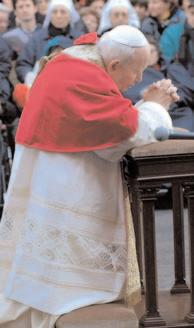


WA’s only Catholic weekly newspaper
Perth: 30 October 2003 Price: $1


Stand against sex “Sell
the product not our bodies”
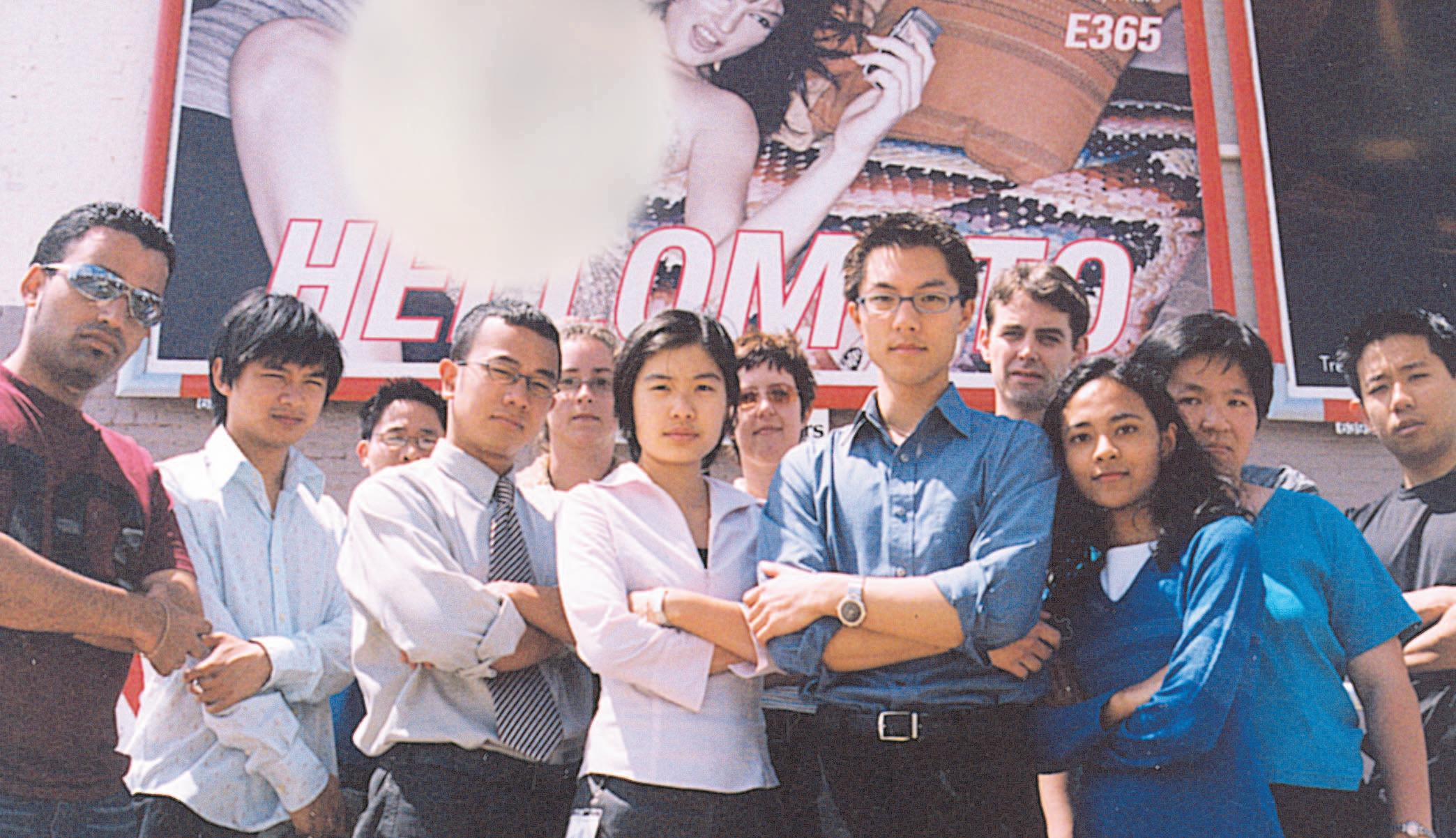
Against “sex sells” ads
By Debbie Warrier
Agroup of young people are taking a stand against a sexually provocative advertisement by LIVE Clothing company and want others to join them.
The advertisement depicts a 15 year old female model lying provocatively on the ground, as a 23 year old male model lies on top of her.
Sick of the crass “sex sells’ approach, Jing Ping Wong decided to take a stand on behalf of all young people. Rallying his sisters, friends and like-minded youth groups he held a meeting at the Edel Quinn Centre in Perth, on Monday October 27.
Together those assembled produced a media release voicing their objection. They have written a protest letter to LIVE Clothing Marketing manager Mr Hayden Marchetto. LIVE Clothing representative Bradley Caswell responded to their concerns in an email which is printed here in full.
In light of the response, they plan to approach the Advertising Standards Bureau to voice their concerns that the LIVE Clothing’s advertisement breaches advertising codes.
Live Clothing Response
Dear Jing
Thank you for your email re the catalogue shot of Gemma and David.
Whilst I am sure that your concerns are genuine we cannot agree with your request.
I think you are severely underestimating the intelligence and maturity of our customers and blowing this episode out of all proportion.
In Jing’s view the advertising companies are more concerned about profits than portraying a 15 year old as a sex object.
“The ads are saying lust fulfils you,” he said.
However, with the guidance of Pope John Paul II’s Theology of the Body, Jing believes he knows the truth.
“The Pope said the human body alone is capable of making God’s mystery visible. This type of raunchy advertising and images displayed in the media quickly tears down the standard of modesty and sexual morality. It ignores the dignity of
Firstly this is one page of a 72 page catalogue which you have not seen and therefore to judge a whole campaign on one image of 72 is premature to say the least. You mention nudity but Gemma is fully clothed and David is wearing jeans with a bare chest.
I would suggest you watch MTV or Channel V or pick up and read Vogue, Cleo, or even Woman’s Weekly and you will see images far more provocative than the one we are discussing.
Regards
Bradley Caswell
people and the true meaning of sex. Not to mention that she’s only 15,” he said. Jing realises that as a young male he could be considered the least likely to campaign against such advertising, but says he’s learnt from experience.
“I don’t want people to fall into the same trap,” he said.
He feels obligated to reach out to others and share the truth about the human body as shared by the Holy Father.
“Inside their hearts, young people know better. Ultimately, we want young people to see the light of the truth,” said Jing.
Such sexually overt advertising is degrading, in Jing’s view. He thinks it would surprise advertisers to know that young people are looking for leadership and positive role models.
“ I n s i d e t h e i r h e a r t s , y o u n g p e o p l e k n o w b e t t e r U l t i m a t e l y , w e w a n t y o u n g p e o p l e t o s e e t h e l i g h t o f t h e t r u t h , ” s a i d J i n g
The images used by LIVE Clothing, Lynx deodourant and Windsor Smith adverts are not positive, he said. They lack integrity, respect and honour.
Acknowledging this may the first time young people have taken a stand on this issue, Jing seems unfazed.
He encourages those who support him in this stand to reflect their values in their every day life.
“Both women and men need to live modestly, to present themselves as more than a physical object. They are also spiritual, physical, intellectual, communicative and emotional,” he said.
Enquiries, contact Jing Ping Wong at adihs7@yahoo.com.au or on 0422 229 232.
Brian Gardner’s HONDA 432 Scarborough Beach Road Osborne Park 6017 Phone: 944 99 000 DL0891 For the best deal on a new Honda, accessories, parts, finance or from our range of quality used vehicles. new@hondanorth.com.au www.hondanorth.com.au HONDA NORTH HONDA NORTH
A group of young people led by Jing Ping Wong (fifth from left) stand in front of an example of a sexually provocative ad that they are asking the advertisers to remove.
Photo:Carole McMillen
DISTRIBUTION
The Record, established in 1874, is distributed to Catholic Churches, presbyteries, religious houses and subscribers throughout the Archdiocese of Per th, Geraldton, Bunbury, Broome and overseas.
THE TEAM
Managing Editor
Peter Rosengren
Production/ Advertising
Carole McMillen
Office Manager
Kylie Waddell
JOURNALISTS
Bronwen Clune
Debbie Warrier CONTRIBUTORS
Hugh Ryan, Paul Gray, Fr Tim Deeter, Tony Evans, George Russo, Peter Dwan, Norma Woodcock, Guy Crouchback SUBSCRIPTIONS
Subscribe to The Record (46 issues) and Discovery (6 issues)
$55 per year.Send subscription with cheque or money order.
Editorial:Tuesday
mail
Crucifix barred
Ajudge in central Italy set off a debate after he ordered the removal of crucifixes from classrooms in an elementary school. Mario Montanaro ruled that laws requiring schools to have a crucifix in every classroom showed preference for Catholicism and ignored the role of other religions in society. He gave the elementary school in the town of Ofena 30 days to remove the crucifixes. The case was started by Adel Smith, president of the Muslim Union of Italy, whose children attend the Ofena school. Bishop Giuseppe Betori, general secretary of the Italian bishops' conference, said the judge's decision violated national laws.
On a mission ...
Peace for Life Mass
By Debbie Warrier
Catholic Mission marked World Mission Week with an inaugural Mass themed ‘Peace for Life’ at Good Shepherd’s Church in Lockridge, on Wednesday October 22.
The main celebrant was Bishop Don Sproxton supported by 12 other priests.
Attending the Mass was a mixed congregation of primary, secondary and tertiary students, educators, clergy, pastoral workers, and parishioners from across the Archdiocese.
In his homily, Bishop Sproxton spoke of the Pope John Paul II’s Silver Jubilee and Mother Teresa’s recent beatification.
If you are single, Catholic, male, 20 and up and if you are thinking of becoming a priest in the Archdiocese of Perth, you are invited to join us:
Where: 18 Teague St, Victoria Park WA 6100
When: 6.30 pm, Friday, 7th November
Please confirm: (Fr Armando.)
Tel/Fax 9470 9113 prvocation@hotmail.com
WORLD APOSTOLATE of OUR LADY of FATIMA
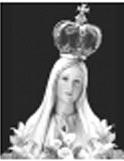
is holding an Evening Vigil at Sts John and Paul Church, Munster F r i d a y N o v e m b e r 7 starting with Mass at 7pm followed by Exposition, Prayers and Benediction finishing at 10pm.
Intentions for World Peace and the Family ALL ARE WELCOME
The Bishop said simplicity characterised Mother Teresa’s life.
The late religious leader of the Missionaries of Charity wasn’t much concerned about the future because of the trust and friendship she shared with Jesus.
Although her life had many sufferings, Jesus allowed this so she could gain strength and learn from those experiences, Bishop Sproxton said.
He also acknowledged the work of the catechists in the schools. “They too have a Mission, not without difficulty
Discarded books salavaged for East Timor
By Debbie Warrier
The Claremont community has arranged a rescue mission with a difference. They have sifted through 2.5 tonnes of discarded books to donate to East Timor.
Most of the books have been salvaged, said Mrs Moira Hudson Smith, a participant in the project.
Describing it as an “ecumenical effort,” she explained how the community became involved.
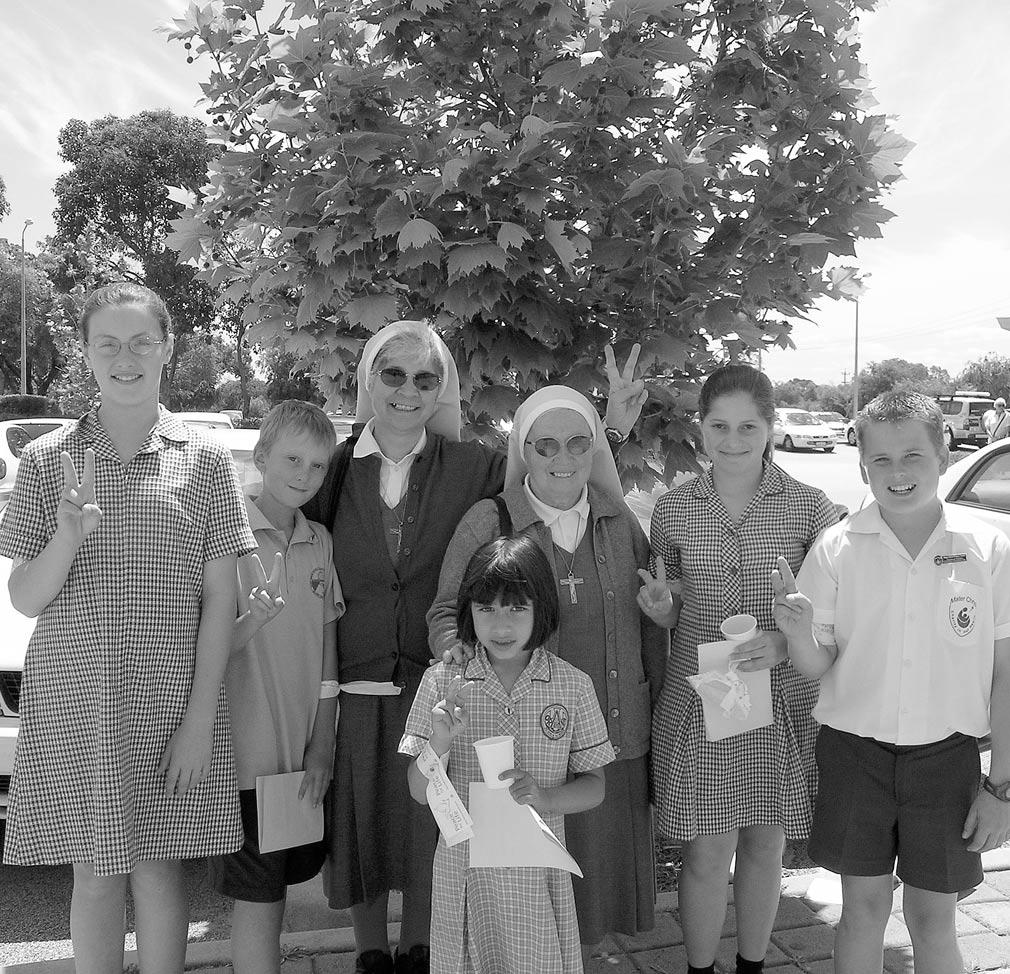
Ursuline nuns Sr Clara and Sr Pia with children at the World Mission Mass
or persecution,” he said.
Speaking to the school children, Bishop Sproxton told them “No matter what year you are in at school, you will know friends who have had difficulties or hardships.
These experiences help us to understand the suffering of those in other countries,” he said.
Bishop Sproxton told those assembled at the Mass that
Nedlands City Councillor Mr John Bell contacted St Thomas School Principal Mr Mark deKluyer about a collection of books in the Council depot. The books were being thrown out because some had been damaged by water. Mr Bell asked if Mr deKluyer could arrange for the good ones to be donated to charity. Mrs Hudson Smith said Mr deKluyer studied with her at Notre Dame University, and invited her to participate. An advertisement for additional volunteers was placed in the parish newsletter. Director of Fr Brian’s Crisis Care Centre, Father Brian Morrison, lent his support to the project, as did St Thomas the
“each of us is called to be a Missionary.” He added that this did not require people to travel overseas or even to try to emulate Mother Teresa’s way of life. The sisters of the Missionaries of Charity would now take over from where she left off, with their individual approach.
“We each have a unique mission. Only we can do it in partnership with Christ,” Bishop Sproxton said.
Apostle Church parishioners, and the local schools.
There are still plenty of books to be sifted through, and Fr Brian is clear he doesn’t want any damaged ones sent to East Timor. Fr Brian said he is sending two containers from WA containing rice, pharmaceuticals, hospital equipment, children’s shoes, children’s wheelchairs made by Brother Ollie, a large supply of light material for clothes and the books. The books will be sent to Mansaul Ministries, East Timor. The Catholic organisation aims to eliminate poverty and sickness in East Timor. It is registered under the local President and Prime Minister.
Indonesian Catholics produce souvenir
WA 6902
The Western Australia Indonesian Catholic Community (WAICC) produced a souvenir book of their 10th Anniversary celebrations in 2002, this year.
In the book, Archbishop Barry Hickey wrote of WAICC’s contributions to the community, to local parishes, and to the call to evangelisation through the RCIA program. The Archbishop noted their commitment to the Mass, the sacraments and their Marian devotion. After listing WAICC’s other achievements, he observed an innate asset of their ethnicity.
“Your heritage as Indonesians, as Catholics and Australians speak to you of unity in diversity,” the Archbishop said.
Archbishop Hickey offered the Church’s welcome to all people of all places and his congratulations to WAICC.
Bishop Don Sproxton and the Vicar for Migrants Father Tony Paganoni C.S. also wrote messages to the WAICC. As well as religious activities, the WAICC visits the sick in their community, and holds social functions that promote community spirit.
In 1986, then Bateman Parish Priest Father Peter Whitely was approached by three of his Indonesian parishioners Pak Willy Santoso, Ibu Daisy and Pak Lazuardi who had a special request. They asked Fr Peter if the Indonesian Ecumenical Family Worship gathering could use the Church. The Church
required further construction and so Fr Peter agreed to be a guest preacher at their gatherings.
In time, he was taught Indonesian Bahasa by one of the members and was able to celebrate Mass in the homes of members. Supper usually followed and the sense of community that grew eventually became the WAICC.
Senior WAICC members, past and present, wrote messages in the Anniversary book. Indonesian Chaplain Fr Rikardus Moses Jehaut wrote “In my opinion, the most important thing of all, is that WAICC as a Lay Association of Christ’s Faithful must go forward with a renewed spirit.”
The Record 2 30 October 2003
3380
No.
ADVERTISING
first
Advertising: Booking:Monday midday
midday CONTACT US 587 Newcastle Street, West Perth, WA 6005 POBox 75, Leederville,
Tel.9227
Fax 9227 7087 or find us on the web www.therecord.com.au Editor cathrec@iinet.net.au Classifieds/ Advertising advertising@ therecord.com.au Accounts administration@ therecord.com.au 200 St.George’s Terrace,Perth WA 6000 Email:admin@flightworld.com.au ® Travel Services Lic No.9TA796 Italian Holiday FOR ALL THINGS ROMAN * Meet & Greet * Boutique Hotels * B&B * Country or City Villas * Monastery/Convent Accommodation * Theatre/Language Assistance * Restaurants * Private Car Touring Contact Michael or Sabina (08) 9322 2914 Italian Holiday YOUR MANNING & ASSOCIATES OPTOMETRISTS Contact Lens Consultants Mark Kalnenas (B. optom) Grove Plaza, Cottesloe 9384 6720
Copy:Tuesday
7080
Books headed for East Timor INBRIEF ...
By Debbie Warrier
INVITATION TO DINNER WITH ARCHBISHOP HICKEY
A new lease of life for old convent
By Debbie Warrier
The 100-year-old heritage site of Our Lady of the Mission Sisters’ Sacred Heart Convent in Highgate has been purchased by the Archdiocese to be converted into offices.
The last residents of the convent vacated the property in 2001. As the sisters got older, the upkeep of the property proved difficult so they found alternative accommodation in nursing homes or a nearby Church owned residence in Mary Street
Behind them they left an intact chapel, building and grotto.
H e r i t a g e a r c h i t e c t P h i l i p
M c A l l i s t e r i s i n v o l v e d i n t h e r e s t o r a t i o n p r o c e s s . H e s a i d a n o r i g i n a l f r i e z e w i t h g o l d w r i t i n g i n L a t i n h a s b e e n d i s c o v e r e d i n
t h e c h a p e l .
All Church offices currently located at 459 Hay Street will be moving into the newly restored Highgate building. The Hay Street offices have been sold. The cost of the office redevelopment, including demolition and the building of car parks is about $2.4 million.
The restoration has uncovered some insights into the past.
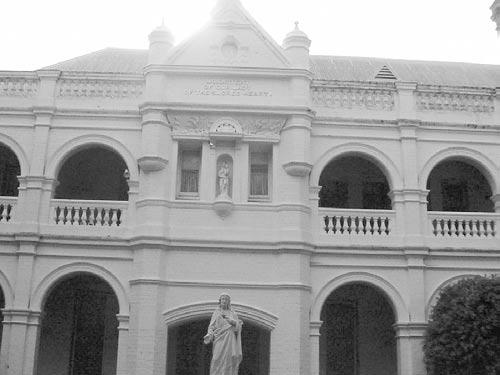
Heritage architect Philip McAllister is involved in the restoration process.
He said an original frieze with gold writing in Latin has been discovered in the chapel. There are also original tiles lining the entrance of the school built on the site and a century old grape vine in the grounds.
Once restored, Mr McAllister said the chapel would be available for private functions.
The dining room will be converted into a seminar room with a capacity for 70 people. Additional parking on the site will provide weekend parking at the Sacred Heart Church at Highgate, he said.
On weekdays office staff will be using that facility.
One of the more noteworthy changes is that the school based on the site has been given a new lease of life. Sacred Heart
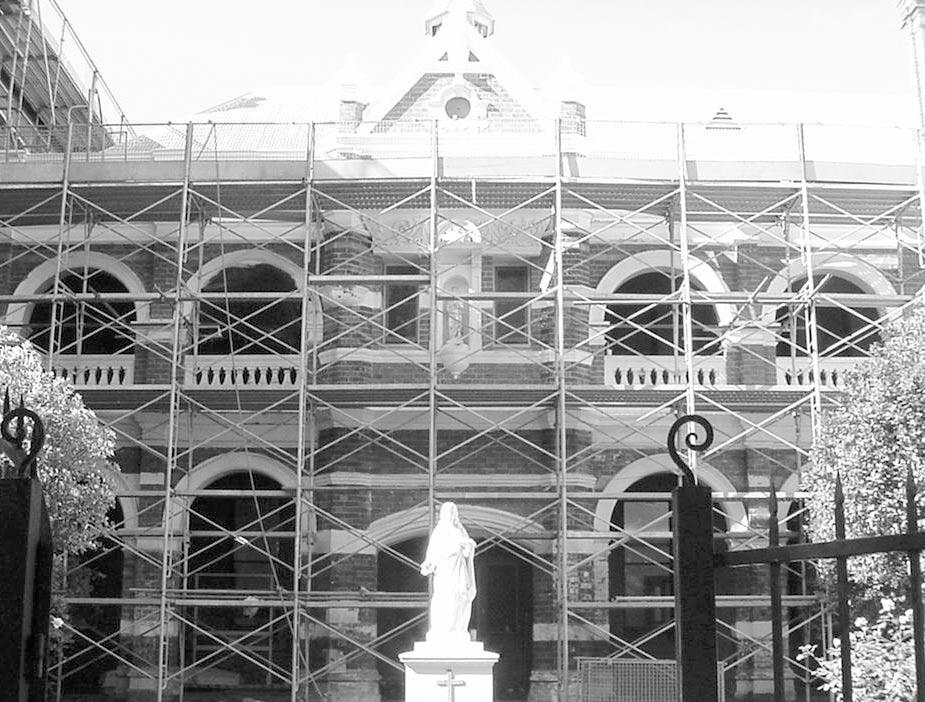
Primary School students are looking forward to moving into the renovated site in about a month’s time.
Since renovations began they have all gone by bus to a temporary location at the
Still helping after 50 yrs
Volunteer undeterred by break in
For just over 50 years
Hillary’s resident Terry Loughnan has quietly helped hundreds of people in need as a volunteer for the St Vincent de Paul Society.
The State’s largest charity acknowledged their volunteer as a quiet achiever who “gets on with the job.”
This dedication was exemplified duringa recent incidentwhen Terry borrowed the Society’s 10-seater bus to transfer delegates from a State conference to the airport. He parked his Ute in the Society’s Headquarters in Belmont.
On his return from the airport, he found that his Ute had been broken into. The passenger
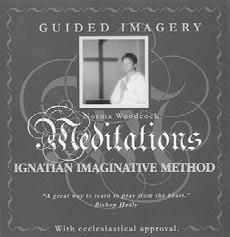
Great Christmas Gifts
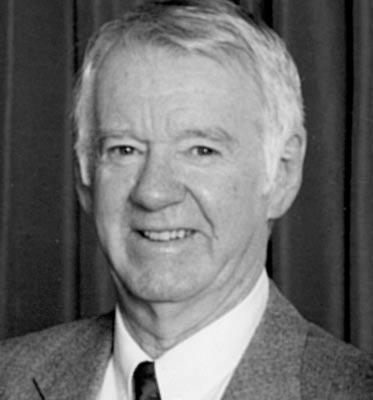 Terry Loughnan
Terry Loughnan
window had been smashed and his tool box stolen. Another staff member, Ed McCarthy also had his car broken into at the same time.
Terry was fully insured but he uses the tools that were stolen to help with handyman and gardening jobs at the homes of people in the community who call St Vinnies for assistance.
“The worst part is they took
my keys. I wonder whythey did it?” said Terry. He added that it hasn’t changedhis desire to help others. “We work to the traditions of our founder Frederic Ozanam who started in Paris in 1833, visiting people in their own homes,” said Terry.
“We provide food, clothing, and essential household items to those in crisis,” he added.
Terry first started as St Vinnies’ volunteer when he was 15 years old, and still finds it satisfying50 years later. He said there are still many people who are in great need.
“You hope you are making a difference to lives of people you are asked to assist. I’ve had a good life and it is rewarding to give to others,” he said.
Enquiries on becoming a St Vinnies’ volunteer, contact 9475 5400 or log on to www. vinnies. org.au/wa
old Chisholm school site in Wood Street, Bedford every day for two school terms. Office staff will have to wait a little bit longer with their move scheduled for around Christmas time.
No ban on altar girls
Altar Girls Still Have Backing of Holy See
The Holy See is not opposed to girls as altar servers, says a press statement by the Catholic Bishops of England and Wales. According to the statement, the bishops discussed with the Congregation for Divine Worship and the Sacraments the muchleaked draft instruction concerning abuses involving the Eucharist. The conference's liturgy adviser, Father Allen Morris, summarised the results for the forthcoming December edition of the Liturgy Newsletter. "Because the text of the instruction is not yet finalised, it is not possible to say for certain what it will contain," he said. "However, it is clear that bishops [will] remain free to authorise the ministry of altar girls in their dioceses; that the encouragement to Communion under both species, recently re-emphasised in GIRM,
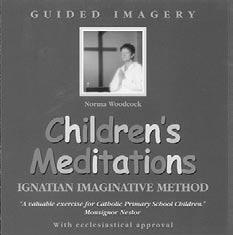

is not being withdrawn; and that liturgical dance or perhaps more accurately 'rhythmic movement' such as is indigenous to a local culture, most commonly in Asia and Africa, remains authorised."
GIRM is a reference to the third revised edition of the General Instruction of the Roman Missal.
Father Morris, who is secretary of the bishops' Department for Christian Life and Worship, added that his understanding from the meeting was that "the practice of interpolating dance and other 'entertainment' into the liturgy, in ways more common in Europe and North America, continues to be considered inappropriate."
Reflecting on leaks to newspapers that altar girls might be banned by the Vatican, Bishop Jabale said: "The stories unsettled people and caused an enormous number of letters to bishops. It was not helpful and, in the end, these things are not going to happen."
Arise From Darkness
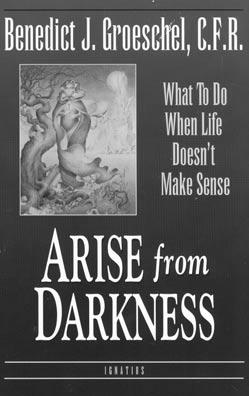
Well-known author, psychologist and priest Fr Benedict Groeschel draws on his own years of personal experiences in dealing with people’s problems, tragedies and “darkness” as he offers help and guidance for any Christian troubled or burdened by life. If you are struggling with fear, anxiety, grief, loss of loved ones, hurt, anger or anything that makes life difficult or the road through it dark, then this book was written for you. Fr Benedict offers practical suggestions on how to keep going and even grow with the help of God’s grace, even when this help seems remote.
“I would put this book high on anybody’s list; at the top of mine. A work to read and re-read. We are in Fr Benedict’s debt.”
C a r d i n a l J o h n O ’ C o n n o r
Just $25 + postage available from The Record now.
(08) 9227 7080 or administration@therecord.com.au
The Record 30 October 2003 3
Before After
The facade of the convent before and after it had been restored. The staff based at the Church Offices at 459 Hay Street will be moving in at Christmas time.
the
WORD
by Norma Woodcock ‘ALL SOULS ’
Many years ago, when I visited an Aboriginal community in the north of WA as part of my work schedule, I had an experience that ties in with this Sunday’s readings.
An elder in that particular community came to me and asked me to pray for him. He was an elderly man, tall, statuesque, with gentle eyes and a gentle manner.
I remember him well. His eyes were questioning, beseeching. He inclined his head and bent down a little to look into my face. ‘What do you want me to pray for,’ I asked with a smile.
He answered, ‘You ask God him make me young again.’
I’m sure there was some fear motivating the request. What difficulties awaited him as he physically became weaker with age. Life is not easy for these wonderful people, especially as they lose their nobility and independence.
I looked at him steadily and asked gently, ‘If God makes us young again, how will we ever go to be with him one day in heaven?’
His eyes held mine and as I spoke of the wonderful life God has in store for us, I saw resignation, but also hope in his eyes and on his face.
To you and I today this same truth holds fast.
Whatever life presents us with, now and in the future, we need to remind ourselves, ‘One day, this too will pass.’
We, like our loved ones who have gone before us, are on a journey to our heavenly homeland. For this we long.
As the Psalmest says in the Responsorial Psalm, Ps26:1,4,7-9,13-14.
‘I am sure I shall see the Lord’s goodness in the land of the living. Hope in him, hold firm and take heart. Hope in the Lord.’
In the 1st reading, Isaiah 25:6-9, we hear about the wonderful banquet God has in store for us and that, ‘…….. he will destroy Death forever. The Lord will wipe away the tears from every cheek; he will take away his people’s shame everywhere on earth, for the Lord has said so.’
The 2nd reading Romans 5: 5-11, tells us Christ died for us while we were still sinners. Therefore, ‘……….we are filled with joyful trust in God, through our Lord Jesus Christ, through whom we have already gained our reconciliation.’
The Gospel, Mark 15: 33-39; 16: 1-6, presents us with two contrasting pictures. Christ’s death and Christ’s resurrection.
As St Paul said, if it wasn’t for Christ’s resurrection all our preaching would be in vain.
In the gospel we have the story of Mary of Magdala, Mary the mother of James and Salome who came to anoint the body of Jesus. They arrived and found that the store had already been rolled away from the entrance to the tomb. On entering the tomb they saw a young man dressed in a white robe who said to them. ‘Do not be alarmed; you are looking for Jesus of Nazareth who was crucified. He has been raised; he is not here.’(N.R.S.V)
I like what St Ambrose, Bishop and Doctor said on this scripture.’ What however were these holy women seeking at the tomb, if not the body of the Lord Jesus? And you, what is it you are seeking in the Church if not Jesus, that is the Saviour?’
Let us decide to-day to intensify our search to know Jesus more and to give ourselves to him in ever greater abandonment for one day we will be with him for all eternity as are our loved ones who have gone before us.
Norma Woodcock is the Director of The Centre for Catholic Spiritual Development and Prayer. Website: www.normawoodcock.com
&
OpinionReflection &
Catholic opinions from around Australia

I
Say, I Say....
Sunday on with Guy Crouchback
Irecently noticed, observing the uniforms and badges of pupils at a certain well-known local school, that they had as a motto: "Seek justice."
Frankly, I am a bit dubious about this. Note I am not absolutely condemnatory, merely dubious. Justice is no doubt a fine thing, and there is not necessarily a great deal of it around, but, first, does this motto mean seek justice for oneself or for others?
At its worst interpretation seeking justice for others calls up images of some priggish child castigating its parents for not putting their food into envelopes to send to the starving, or the economic illiterates who parade around waving placards castigating the likes of Nike for the apparent crime of providing jobs for Third World people rather than allowing them to starve picturesquely.
If, however, one is going to seek justice for other people, there are a number of caus-
OBITUARY
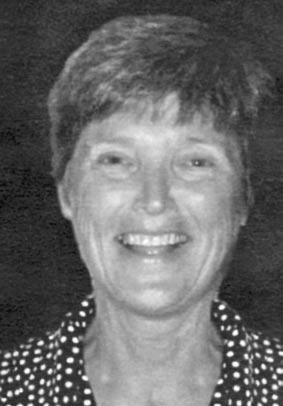
PATRICIA MARY de GRUCHY (1942-2003)
On Tuesday 9th September,
Patricia de Gruchy lost her six-month battle with cancer and passed away at home surrounded by her husband Des and her six children.
Before her marriage to Des 39 years ago, Pat, then Pat Horner, was a full time worker for the YCW (Girls) in Perth.
After leaving school Pat was a member of the Scarborough Parish Youth Club, which eventually changed to become a YCW group, where its program
es where a bit of it would be a good thing. These are the unfashionable ones that one tends not to hear much about. Vietnam, for example, is a place virtually without political and civil rights. It is a One-Party police state. Laos is much the same. Cambodia has been rid of the psychopathic Pol Pot regime for some time, but the human rights situation there could also do with a bit of Justice.
I n d e e d , a s r e a d e r s o f T h e R e c o r d i f n o t o t h e r s w i l l b e a w a r e , C h r i s t i a n i t y w o r l dw i d e r e m a i n s t h e m o s t p e r s e c u t e d o f t h e m a j o r r e l i g i o n s
There is evidence that in the Sudan slavery has been revived, with the Government tolerating or even actively encouraging the enslavement of
helped them to bring the Gospels more into their daily lives. Already Pat was an outstanding example of the lay apostolate role in the Church.
Pat as President of this group ran an active group and also being a Diocesan Executive member she spent many weekends at Marian Lodge. If not participating in Retreats and Training Days, she was up there cooking for others.
Leaving the Bank in 1962 Pat became full time Secretary at the YCW Office then based in St George's Terrace.
During this time her cheerful enthusiasm inspired so many with whom she was in contact, especially young women who were looking for some leadership.
Pat seemed to have a natural ability to spot potential in others and supported them in developing their own talents – showing the mark of a true leader. At one stage Pat held the position of both diocesan President and Secretary. Her work required many long hours and gave little financial reward. She started groups and supported existing groups, which required detailed plan-
Christians. Indeed, as readers of The Record if not others will be aware, Christianity world-wide remains the most persecuted of the major religions. China is monstrously unjust but probably too strong to do much about, except press and niggle at as we mayand that is not futile: the Internet may be a powerful instrument against tyranny there as elsewhere; Zimbabwe is monstrously unjust but weak and collapsing. In Britain new politically-correct laws seem to favour criminals over victims of crime like Norfolk farmer Tony Martin. According to latest reports, one of the violent and conscienceless professional criminals who targeted Martin, alone in a lonely farmhouse, is to be allowed to sue Martin for injuries he received when the terrified Martin defended himself, while a man who fished abandoned golf-balls from a club-house lake and re-sold them for a few pence
ning and personal regular contact. Pat represented WA at the National YCW Conferences with the same enthusiasm she showed locally.
After her marriage to Des (who also was a YCW member and met Pat at a combined meeting) they moved to K arrinyup and the Parish became their life and as their children grew the schools became a focus for strong involvement.
In 1982 Pat and Des were recognised for all their work and awarded the Order of St Phillip, the highest Servite Award.
Pat lived for her family, nothing was ever too much trouble especially when it came to her little grandchildren, she was always aware of others, always had time to stop and talk to those she knew and ready to gather up some friends and go to the aid of someone in need not only bringing in physical help but fun and laughter,
The hundreds of people who attended the Rosary, Requiem Mass and funeral certainly showed the great respect they had for her, but even more the great affection they had for her.
was jailed (he was freed on appeal, but as far as I know the personal responsible for the original sentence is still allowed to sit on the bench). Are we to find justice for all these? I can only say I hope so, and wish the best of luck to those that seek it.
However, when we consider the full implications of the motto there is a little more to it than that. C.S. Lewis, in, I think, Reflections on the Psalms, made the point that the ancient authors of the Old Testament psalms had an eschatology in which they saw Judgement Day as a civil court and themselves as civil litigants at the bar asking for their rights, especially, perhaps, their rights vis-a-vis their Earthly enemies.
The Christian view, Lewis said, was of Judgement Day as a Criminal Court and the Christian saw him or her self as a criminal in the dock, asking not for Justice, which every soul knew it had good reason in those circumstances to dread, but Mercy.
Inquiry sought
Senator Brian Harradine has called for an investigation into claims that a women detainee at Villawood Detention Centre, Sydney, had been encouraged to terminate her pregnancy at a cost of $1500.
Senator Harradine said he understood the woman was about nine weeks pregnant when she was detained at Villawood in 2001.
The claims had only recently come to light and he understood they had been brought to the attention of Human Rights and Equal Opportunity Commission and the Department of Immigration and Multicultural and Indigenous Affairs.
“Fortunately, in this case, the woman concerned withstood the pressure she felt and gave birth to a baby girl,” Senator Harradine said.
Responding to his question without notice, the Minister, Senator Amanda Vanstone, said that in the hour that had been available to her she had been advised by the Department that it was not aware of the particular individual Senator Harradine was referring to, but they were aware that there was a female detainee who, they were advised, had asked for a termination. The detention service provider had provided normal counselling and had offered to meet the cost if the woman proceeded with the abortion.
The woman then decided not to proceed. Senator Harradine said there was a further serious allegation made by the woman who said she was threatened with removal of her daughter unless she agreed to take certain medication. He was also concerned to learn that guards were stationed outside the delivery room door and about claims that some women were denied access to their partners during birth. Senator Vanstone undertook to obtain more information.
The Record 4 30 october 2003
Pioneers: leading the way
By Debbie Warrier
While campus life is commonly associated with excessive drinking, second year Notre Dame University student Tim Grace is happy to go against the norm.
Tim helped to restart the local Pioneers Association and is the president of the Perth branch. The Association originally began in Ireland, founded by Father James Cullen in 1898. Together with Father Doug Harris (then Deacon) and Sister Philomena Butler, Tim set up the Perth branch in 2000 to promote alcohol moderation. There are now 75 registered members in Perth, many of whom are young people.
“We are not anti alcohol, just anti excessive drinking,” he said. Social problems that stem from a high alcohol intake include family breakdowns, alcoholism, mental and physical damage and financial loss.
Tim is a firm believer that the Sacred Heart of Jesus sends graces to those who take the Pioneers pledge.
Evidence of the rewards may be seen in increased self-discipline, health and conversions of alcoholics. Due to the sacrificial nature of the commitment, individuals may experience personal graces and rewards, he said. The association also allows members to abstain from alter-
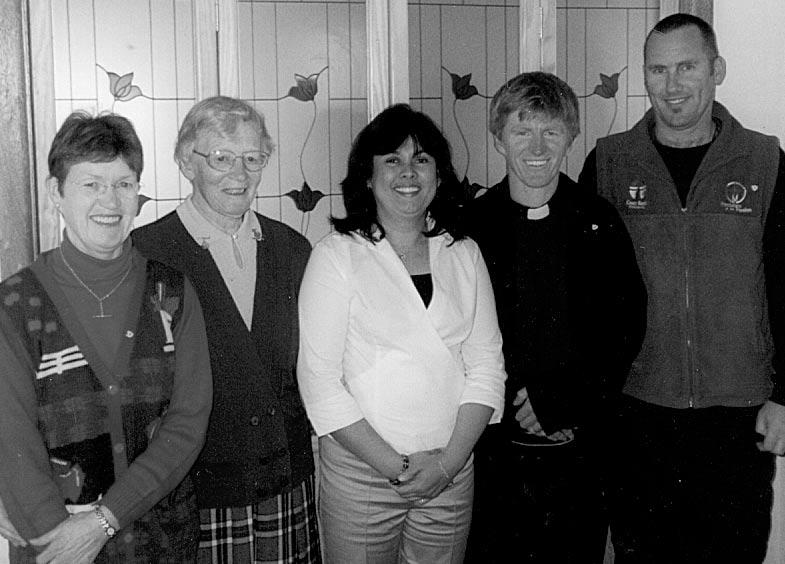
nativehabits or vices, like chocolate or TV. Tim personally found giving up alcohol easier then he thought.
“I would be lying if I said that from time to time I don’t miss a drink; however the positives far out weigh the difficulties,” he said.
While acknowledging not everyone is called to be a Pioneer, he added everyone is called to do sacrifice or penance to some degree.
Tim’s parents, brother, sister and his brother in law are Pioneers. This had some influence on him. However, he was more convinced when he talked to a man at a Christmas party
who had given up alcohol. He said their conversation had an impact on him, confirmed by the Mass readings of the following day. Gradually, it led to his decision to help reestablish the Pioneers locally.
“I am passionate about the cause and its far reaching human and spiritual benefits. I encourage anyone to respond to the initial 12 month trial period,” Tim said. The local Pioneers invite nonregistered members to contact the association for future events and mail-outs. All are welcome. Enquiries, contact Sandra Skerrat on 9244 3425.
Jose Carreras tickets to be won
The Record has 3 double tickets to Jose Carreras for Sunday November 16 to give away.Each double pass is valued at $240.
All you need to do is write in and let us know in 50 words or less what you would like to see in The Record or alternatively what you enjoy about The Record.
Please include your details on the coupon below and send to us no later than Tuesday November 11, the winners will be notified by telephone by close of business Wednesday November 12.GOODLUCK.
Name:
Address:
Telephone:
email:
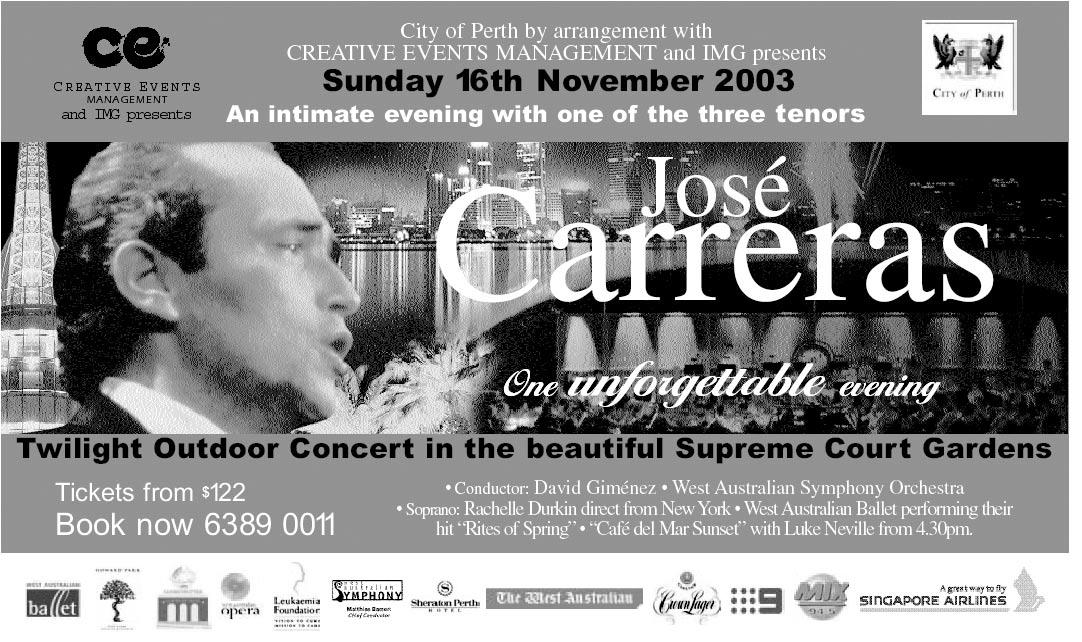
Christopher West takes on all challengers, and makes the case for r the Catholic understanding of these contentious issues. The result is a celebration of sex, marriage and family in an age which has trouble with all three.”

Just $20 plus postage
Available from The Record (08) 9227 7080 or administration@therecord.com.au
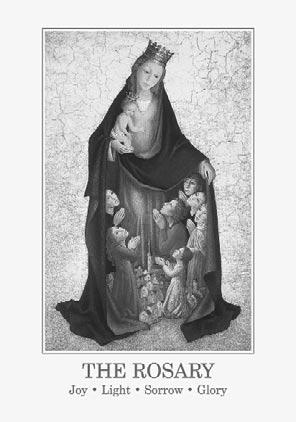
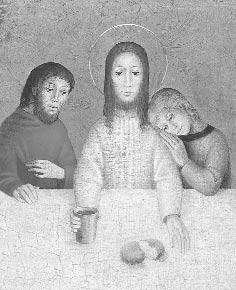
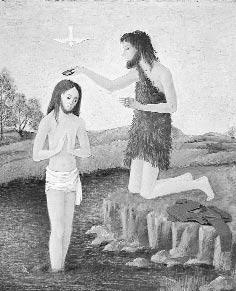
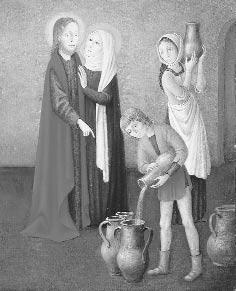
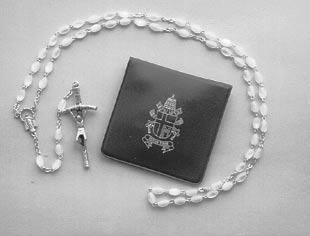
If
Fr
The Record 30 october 2003 5
more
Norbertine
you would like to know
about life as a
priest or brother, please contact:
Peter J Stiglich, O.Praem. St Joseph’s Priory PO Box 354 Cannington WA 6987 Telephone: (08) 9458 2729
norbert@iinet.net.au “Duc in altum!” – “Put out into the deep”. Pope John Paul II has chosen these words of Jesus as the watchword of the Church as she advances with a firm and confident step into the third millennium. Now he has shed new light on the Holy Rosary for us too, and has entrusted it to us as a priceless means of help as we venture forth into the “vast ocean” of the new millennium. By adding the five Luminous Mysteries the Holy Father has enriched our prayer
The Rosary booklet contains
20 mysteries as well as excerpts from the Holy Father’s apostolic letter Rosarium Virginis Mariae, scripture readings, meditations and prayers. This booklet is intended not only for those who have already enjoyed a Christian upbringing, but also for all those who were deprived of this and are therefore unfamiliar with the great treasure that is the Rosary. This beautifully illustrated little booklet is now available fora donation of $3.00 (includes postage). Also available are the Papal Rosary beads. To obtain the Rosary booklet and the Vatican Rosary beads we ask fora donation of $15.00 (includes postage). All proceeds will go towards the work of Aid to the Church in Need for the persecuted and threatened Church worldwide. The Rosary – Joy, Light, Sorrow, Glory Aid to the Church in Need launches new Rosary booklet Featuring the 5 new Mysteries of Light Order Form: “The Rosary – Joy, Light, Sorrow, Glory Send to: Aid to the Church in Need, PO Box 6245 Blacktown DC NSW2148 Phone/Fax No: (02) 9679-1929 E-mail: info@aidtochurch.org Web: www.aidtochurch.org Please send me: Number Amount The Rosary booklet ($3)* . . . . . OR The Rosary booklet and the Vatican Rosary beads ($15)* . . . . . Charity donation (optional) . . . . . Total enclosed . . . . . *Postage included. Limit of 5 copies per order Signature . . . . . . . . . . . . . . . . . . . . . . .Exp Date . . ./ . . . BLOCK LETTERS PLEASE Mr/Mrs/Miss/Ms/Rev . . . . . . . . . . . . . . . . . . . . . . . . . . . . . . Address . . . . . . . . . . . . . . . . . . . . . . . . . . . . . . . . . . . . . . . . . . . . . . . . . . . . . . . . . . . . . . . . . . . . . .Postcode BankcardVisaMastercard Payment method:Cheque/money order enclosed OR Please debit my credit card AID TO THE CHURCH IN NEED A Catholic charity dependent on the Holy See, providing pastoral relief to needy and oppressed Churches PG Beautifully illustrated throughout. Just $3 a copy or$15 forthe Rosary booklet and Papal Rosary. A lovely gift idea! Good News about Sex and Marriage Read the book that’s had people buzzing with excitement ever since it was released in Perth in March. F i r s t e d i t i o n s o l d - o u t i n 2 w e e k s ! “The greatest gifts of God are also those most fiercely assailed. In this spirited defence of marriage and sexuality,
B i l l M u e h l e n b e r g N a t i o n a l V i c e P r e s i d e n t , t h e A u s t r a l i a n F a m i l y A s s o c i a t i o n
Email:
life.
all
Elizabeth Sealy O'Connor, Sr Philomena Butler, Sandra Skerrat, Fr Doug Harris, Tim Grace.
A matter of faith for all of us
On page 11 of The Record today, Cardinal Cassidy tells a delightful story that in the 1950s Mother Teresa often went to the Vatican to get help for her work. She was regularly counselled not to expect things to happen too fast –and she always left wondering how such senior Vatican officials could have so little faith. Now it seems that her good friend Pope John Paul II is providing all of us with an opportunity to exercise our faith. The Pope’s present physical frailty appears to be testing a lot of people’s capacity to trust him to continue to lead the Church, and even testing their ability to trust in Jesus’ promise that He will be with us at all times, even to the consummation of the world.
We have had constant reassurances from those who see the Pope at first hand that his mind, his will and his union with God at are all at their peak, but still there are many who prefer to express their doubts.
However, there is more to the Pope’s public suffering than merely his ability to govern the Church. He is showing us the full meaning of human life in the Christian sense. At a time when the world desperately needs to understand it, he is showing us that living life to the full means exactly what it says and includes persevering
Congrats to our Cardinal I
do general practice locum work in various parts of Australia. In that work I meet relatively few people of child bearing age who do not use contraception in one form or another and I meet very few doctors who refuse to cooperate with this activity. This makes me wonder how far modern society will travel down the contraceptive path, before realising that it is a dead end street.
The golden rule: ‘Always treat others as you would like them to treat you’ (Matthew 7:12) is an essential prerequisite for a civilised society. It promotes the consideration for others which oils the wheels of industry and helps society to function smoothly for the benefit of all.
Couples use contraception so they can enjoy themselves while excluding any third party who may otherwise intrude. This is self-centred behaviour which must act against observance of the golden rule.
But that is not contraception’s only contribution to the ‘me’ generation. Contraception is used so sexual activity will not be complicated by unwanted pregnancies. This attitude easily spreads from preventing pregnancy to terminating pregnancies which have already begun, as shown by the current enthusiasm for morning after pills.
These are taken to expel any baby who may have been conceived before he or she gets a ‘foot in the door’ through implanting in the uterus. And of course if contraception and morning after pills fail, back up is available from a ‘friendly neighbourhood abortionist.’
There could be few actions more selfish than abortion, in which parents have their own child killed because it could cause them some expense, inconvenience or embarrassment. Abortion is a recipe for social disharmony and Australia has too much of that already. Litigation and insurance costs place sporting events and even essential medical services at risk, unemployment and poverty are far too prevalent, pollution, salinity and other environmental problems exist and around 40 per cent of marriages end in divorce.
These problems will only be overcome through widespread consideration for others and a willingness to work together for the common good. They can only worsen if
POBox 75, Leederville, WA 6902
Tel:(08) 9227 7080, Fax: (08) 9227 7087 cathrec@iinet.net.au
through pain and suffering and old age.
St Paul told us long ago that we preach Christ crucified – a scandal to the Jews and a folly to the Greeks, but the wisdom of Christians. He was describing the facts and the meaning of Christ’s life, but not only Christ’s life. It is the meaning of our life, too.
Just as the Jews, the Greeks and the Romans could not understand the Cross then, so our own society struggles with it now. The idea that to continue loving while suffering could be the ultimate act of being human seems to be beyond the comprehension of large parts of our society. This is particularly true of institutionalised sections of the community such as Parliament and the mass media which tend to promote the idea that any life which is difficult in itself or inconvenient for others has little merit. Western Australia is not the world, but here in this little place we have a law that allows doc-
tors to grow rich on public funds by killing ‘inconvenient’ babies in their mothers’ wombs. We also have government-funded organisations which refuse to tell women the consequences of abortions, including the very strong link with breast cancer. (In the first 25 years after Roe v Wade made abortion legal in the US, the incidence of breast cancer went up 40 per cent and it changed from being an old women’s disease to a relatively young women’s disease.)
Following the abortion tragedy, we now have in our Parliament two Bills which threaten life at its beginning and its end. Despite the efforts of a valiant few, one Bill will allow medical experimentation on embryos, and the other, which currently has less chance of getting through, would permit, and thus encourage, suicide and assisted suicide when life gets tough.
It is obvious that legislators who are prepared to move in these directions, and those who to support them, do not understand the Cross, or the striking example being given by a Pope who bears his suffering and what some people would call his humiliation so publicly while continuing to preach the Gospel and inspire humanity. It is an encouraging fact about our society that the legislators are acting
Breast cancer facts
Iread the Article in discovery by Women’s Cancer Team W.A. I also read one of the studies the National Institute of Health actually funded Dr Janet Darling and her colleagues at Seattle’s Fred Hutchinson Cancer Research Centre found that Abortions increased the risk of Breast Cancer on an average of 50%.
This study is conveniently absent from the Website of N.C.I.
Dr Darling is pro choice, but to her credit as a true scientist, she threw her ideology aside and was driven by a search for the truth. She had hoped there wouldn’t be any linkage between abortions and breast cancer, but after a thorough study, you cannot change the facts.
contrary to the example given by most people who are called upon to make a specific choice between the Cross and the life of a loved one.
Whether they are Christians or not. the heroic behaviour of so many parents who devote their lives to the care of children with severe physical and mental disabilities, and of spouses and adult children who show the same heroism in relation to the end of a partner’s or a parent’s life, reveals that people intuitively know the value of human life and know how to respond to the needs of that life. For all of us, whether faced with this challenge or not, this is a test of our personal faith.
The Cross is not merely something extreme or unusual that Jesus did. It is a declaration by Jesus that this is the meaning of life, a declaration that life cannot be understood properly in other terms. If we try to understand the riddle of life without the Cross, we will get it seriously wrong.
After a long and extraordinarily fruitful life, Pope John Paul II is giving us a wonderful opportunity to reaffirm and strengthen our faith and understanding about the meaning of life. Let us not waste it in idle speculation, but rather let us share it with him with all the intensity we can.
disease. Between them Liz’s parents kept an almost 24 hour watch at her bedside.
Talking to her mother one night over a cup of coffee I asked how she and her husband managed and still kept their faith and love of God? I unashamedly stated crying at her reply. ‘Our only difficulty is trying not to over protect our fourth child.’ They are my heroes.
A n n W o r n e r
Joondanna
Not so funny
Iam deeply concerned by these reports circulating in the international secular media in recent days of the latest utterances coming out of Rome on the matter of condoms and AIDS.
contraception and abortion continue at their present rates.
D r L e s H e m i n g w a y Warrnambool
Parent education
In The Record of August 21, there is an article by Archbishop Hickey. It stated that he was floored by the fact that at one Catholic secondary school not one boy or girl in year 12 went to Mass.
But in The Record of September 4 the new Catholic Director of Education, Ron Dullard, advises that ‘….the future of Catholic education in WA is looking bright and rosy.’
In my view the problem stems from the 1960 – 1970 period when the parents of our current children grew up. At this time there was a general deterioration of morals worldwide. So far as Catholics were concerned this saw a widespread rejection of the Pope’s encyclical on birth control. This in turn resulted in the concept that if the Pope could be ignored on birth control, so also could be ignored the teaching of the Church on attending Sunday Mass. If you require confirmation of this look at the bald heads and grey hairs at Sunday Mass.
So the problem does not all lie with the Catholic education system. How can children be expected to attend Sunday Mass when their parents do not?
The article in The Record of September 4 refers to preparation of new religious units for use in schools. I suspect that some units should be prepared aimed at parents.
Most ominous of all were the results for women who had had an abortion before the age of 18 and had a family history of breast cancer; every one developed breast cancer by the age of 45.
The slightest possibility of this being the truth should be admitted by Planned Parenthood and other abortion places, but then they would lose money.
But what is the excuse for The Susan G Women Breast Cancer Foundation for not warning women of this risk.
We do need Pink Ribbon Day for all the innocent women who through no fault of their own find themselves with breast cancer and also the others who aren’t given all the facts and truth and possibilities.
M r s M a r g a r e t T h o m a s Mullewa
Other heroes
In recent weeks we have been inundated with stories of the heroic lives of Pope John Paul II, Mother Teresa and the Bali victims. I too salute them.
This led me to thinking of all the unsung heroes and heroines in our daily lives. Perhaps as part of our parish evangelism programs we could seek out and help the heroes and heroines in our daily lives who daily care for sick, disabled and challenged partners, parents and children.
The most heroic people I have ever met was in the 60’s working as a student nurse in the children’s ward. At the top of the ward we had single rooms, nearest the nurses’ station, for the very sick. In one room was a young 11 year old. I’ll call her Liz. Liz was dying of leukemia. Her two older siblings had already died of the same
What is being said is simply scientifically untenable by any stretch of the imagination. I do honestly believe that the only reason we are increasingly seeing these bizarre reports emanating from Rome at the moment is because the Pope is now losing control of the whole ship and anyone is now free to say almost anything they like. The no doubt sincerely motivated but abysmally silly conservative sectors of the Curia have decided to start making hay while the sun is setting on the long pontificate of Pope John Paul.
The statements the secular news media are carrying in recent days would be hilarious were they not actually the cause of such grave damage to the whole social and spiritual fabric of Catholicism. I believe it is time that, on behalf of all the ordinary Catholics, including those tens of millions in the Western world who have now left, that the Bishops out at the coal face of life should be venting extreme displeasure to their Apostolic Nuncios so that the view at the grass roots of the Church are conveyed to His Holiness, Pope John Paul II, and the highest levels of the Vatican in the most unmistakable terms. The bishops do have to act now. The Catholic Church is not a democracy but neither is it meant to be a lunatic asylum and the laughing stock of the world. In many senses I think Rome with its fawning sycophancy and constantly trying to please the people the next few rungs higher than one's present station is a form of sickness and "an occasion of temptation" as dangerous to celibates as the allure of unbridled sexual passion is to the rest of humanity!
B r i a n C o y n e Nedlands
- l e t t e r s c o n t i n u e d p a g e 1 4
The Record 6 30 october 2003
r i a n O ’ L e a r y Dunsborough
B
LETTERS TO THE EDITOR
Around t he tabl e dnuorA t eh lbat e
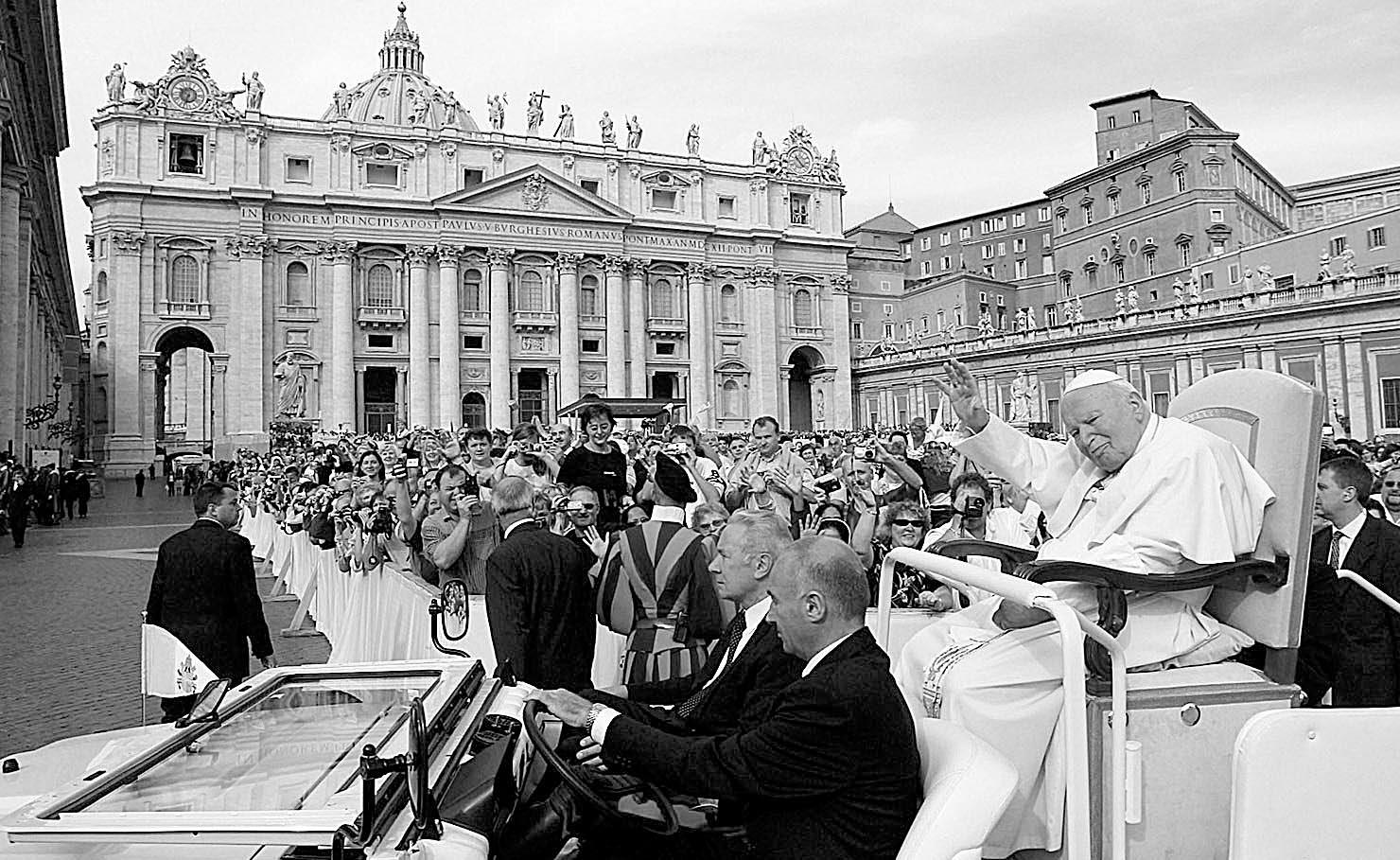
OOctober R Rome’s FFestival
Aremarkable two weeks of celebration, prayer and discussion came to a close at the Vatican in late October, leaving church leaders with a sense of accomplishment about the past 25 years and some questions about the future.
The accomplishments focused largely on Pope John Paul II, whose 25th anniversary prompted a churchwide pause for reflection. The Pope was hailed as a missionary, peacemaker, ecumenist and teacher, a figure who has stirred hearts and changed the world.
To the wider global audience, that message came through most clearly in the sound bites and interviews that filled the media during anniversary festivities. The Vatican, as usual, used a heavier touch: six very long speeches that explored the theme of this pontificate in encyclopedic detail.
On October 16, anniversary day, the Pope added to his legacy by issuing a new document on the role of bishops in the church, telling them pastoral leadership must be built on personal holiness. To many, the Pope seems to embody his own advice. Yet it was the frail figure of Pope John Paul - trembling, unable to stand and at times unable to speakthat added a bittersweet element to the celebrations.
Many of the cardinals had not seen the Pope personally in months, and his physical decline seemed to take them aback. They unanimously praised his courage and commitment to the papacy,
but several wondered how long he could carry on. "It's like our aging grandfather and how you used to sit at the knees of your grandfather with reverence and awe ... but don't have the expectations you had before. These are the sunset years," said Cardinal Roger M. Mahony of Los Angeles.
October marked a new station on the Pope's long personal Via Crucis. His ability to speak, long hampered by his neurological disease, reached the point where he did not even attempt to read his sermons. At the least, it seemed, the church would have to become accustomed to seeing and hearing three top Curia officials speak in the Pope's name: Cardinal Joseph Ratzinger, dean of the College of Cardinals; Cardinal Angelo Sodano, secretary of state; and Archbishop Luigi Sandri, assistant secretary of state. As the pontiff's own visibility and voice declined, their profile increased. The role of the Pope's personal secretary, Archbishop Stanislaw Dziwisz, was also more evident.
At one point in the program, the Pope made an impromptu stop to greet pilgrims packed into the Vatican audience hall. But it was Archbishop Dziwisz who ran the show. After wheeling the Pope out on a stage, he took the microphone, sang the Our Father in Latin, prompted the Pope to bless the crowd, then introduced a hymn and wheeled the pontiff away. The Pope's induction of 30 new cardinals on October 21 seemed to put the finishing touches on the body that will one day elect his successor. Journalists spent a week trying to figure out what kind of pre-con-
clave politicking was going on, but most cardinals said it wasn't that simple.
"If there are these kinds of talks, I certainly haven't been a part of them," laughed Cardinal Adam J. Maida of Detroit. Yet at a more subtle level, appraisal was occurring nonstop.
T o t h e w i d e r g l o b a l a u d i e n c e , t h a t m e s s a g e c a m e t h r o u g h m o s t c l e a r l y i n t h e s o u n d b i t e s a n d i n t e r v i e w s t h a t f i l l e d t h e m e d i a d u r i n g a n n i v e r s a r y f e s t i v i t i e s .
Indian Cardinal Ivan Dias got high ratings from several cardinals when he spoke about the church's shift to the Third World and its missionary implications. Already being touted as a potential papal candidate, newly installed Cardinal Angelo Scola of Venice generated some of the most intense media interest and the biggest crowd at the Vatican's post-consistory reception.
As Cardinal Scola was being interviewed by CNN in St. Peter's Square, Austrian Cardinal Christoph Schonborn, another cardinal on some people's short list of "papabili," walked by. "There goes a man of the future," Cardinal Scola said. For his part, Cardinal Schonborn sang the praises of African cardinals and suggested one of them might be chosen as the next Pope.
While the cardinals were more than willing to identify areas of challenge for the church - a mixed bag of issues including collegiality, parish life, ecumenism,
the technological revolution, the media explosion and global economic imbalance - there was little evidence that they were engaged in serious planning for the postJohn Paul II era. They were checking each other out, not counting future votes.
What came through loud and clear at the consistory ceremonies was the international make-up of the modern church. It wasn't just the faces of the cardinals, who today represent 69 countries, but the enthusiasm of their followers. Vatican officials who heard Scottish bagpipes harmonising with African ululating in St. Peter's Square were reminded that the church is more than Rome.
The other big happening in mid-October delivered a similar reminder. The beatification of Mother Teresa of Calcutta was an event that seemed to cut across the lines that sometimes divide Catholics: liberal and conservative, First World and Third World, men and women, Rome and the rest of the world.
The 300,000 people who showed up for the beatification were average Catholics from every continent, moved by someone who dared to live what others preach. For U.S. church leaders in particular, it was a welcome story. Father Ken Doyle, a former journalist now serving as chancellor for the Diocese of Albany, N.Y., said he did eight interviews with major media from Rome.
"For the last two years, I've done nothing but answer questions about sex abuse. With the beatification of Mother Teresa, we finally have some good news to share with our people," he said. - CNS
A BIGMONTH INROME
■ The red birettas: Pope elevates 30 new cardinals pages 8-9
■ Blessed Teresa: Pope honours Mother Teresa at her beatification pages 10-11
■ A feminine genius: Focolare founder praises the new Blessed page 11
■ Putting his trust in God’s hands: JPII celebrates his 25th anniversary page 12
The Record 30 October 2003 7
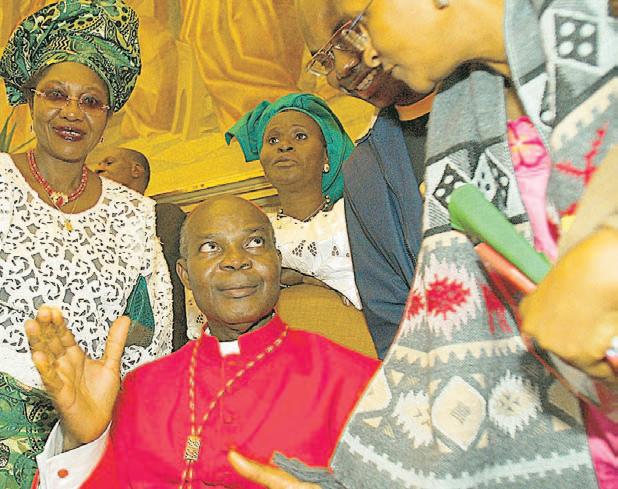
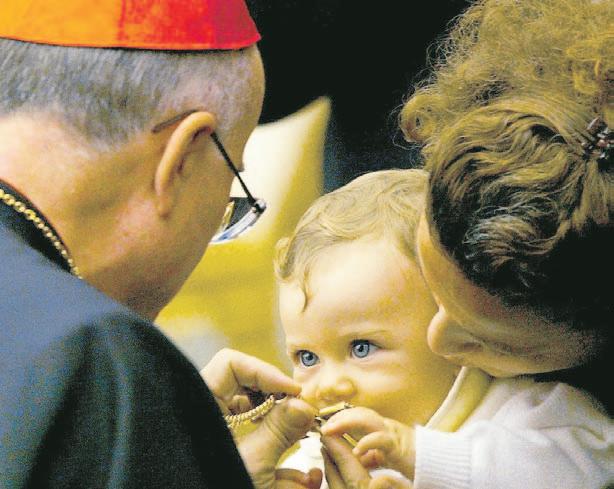
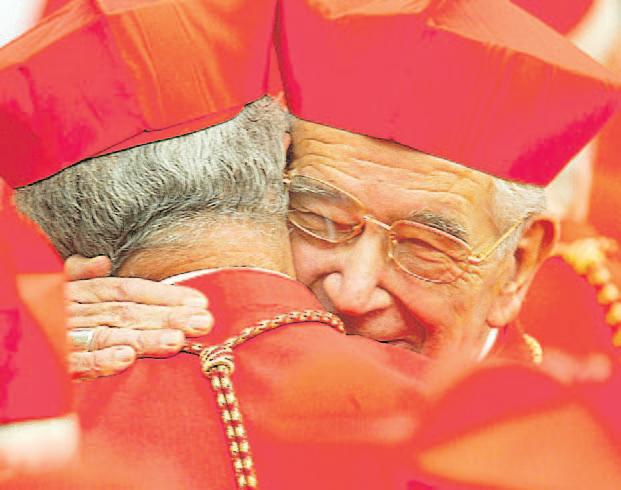
Pomp, flag-waving, family pride abound as Pope elevates new Cardinals.
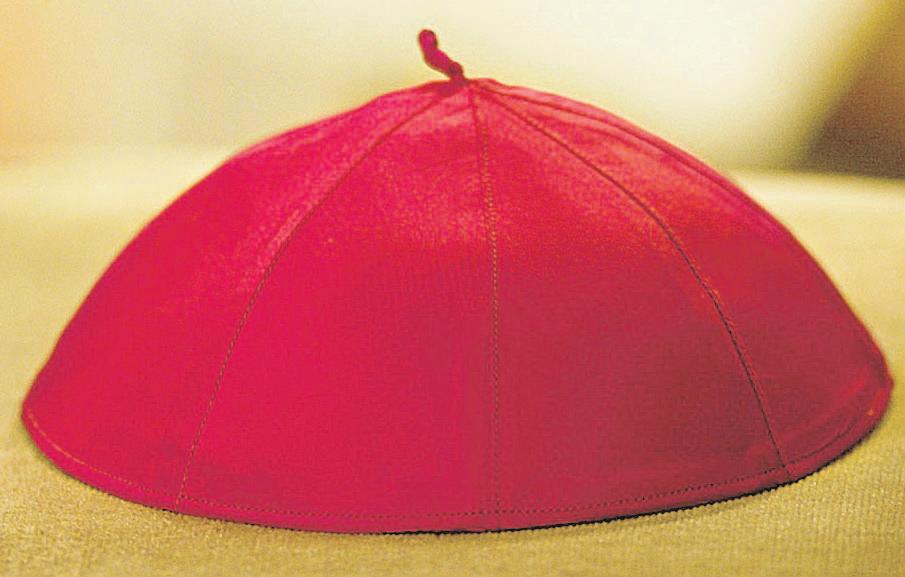 By Patricia Zapor
Photos: CNS
By Patricia Zapor
Photos: CNS
The atmosphere in and around St. Peter’s Square as Pope John Paul II elevated 30 new Cardinals was a combination of strict formality, patriotic fervour and familial pride.
the red birettas
In the morning ceremony, Cardinals and bishops in their formal red and purple robes flanked the flower-festooned stage in front of St. Peter’s Basilica. Near them, the official escorts known as “papal gentlemen” and many members of national delegations wore formal morning coats with tails.
Every step of the ceremony was carefully choreographed in keeping with centuries of tradition. When it came time to receive their red hats from the Pope, the new Cardinals were escorted, one at a time, to kneel before Pope John Paul and kiss his ring. The audience in the square was not bound by the same degree of formality, though.
During the ceremony, as each new Cardinal’s name was read, cheers would arise from a section of the audience, as
guests waved flags and signs. Particularly loud were the large delegations cheering for Cardinal Anthony Olubunmi Okogie of Lagos, Nigeria, and Cardinal Keith O’Brien of St. Andrews and Edinburgh, Scotland.
Toward the end of the ceremony, Polish pilgrims in traditional costumes attempted to start a “wave” when they failed to catch the Pope’s attention by singing and waving red-and-white national flags. Nearby guests with their flags from Nigeria, Guatemala and Mexico did not pick up the cue. The flags and traditional dress made it easy to pick out the homelands of some of the visitors: Ghanaian women in orange kente cloth dresses; Nigerian women in elaborate, towering head wraps; Japanese and Korean women in delicate Asian silks; a handful of Scots in kilts and many more wearing plaid, woollen tams.
Many of the people in the audience said
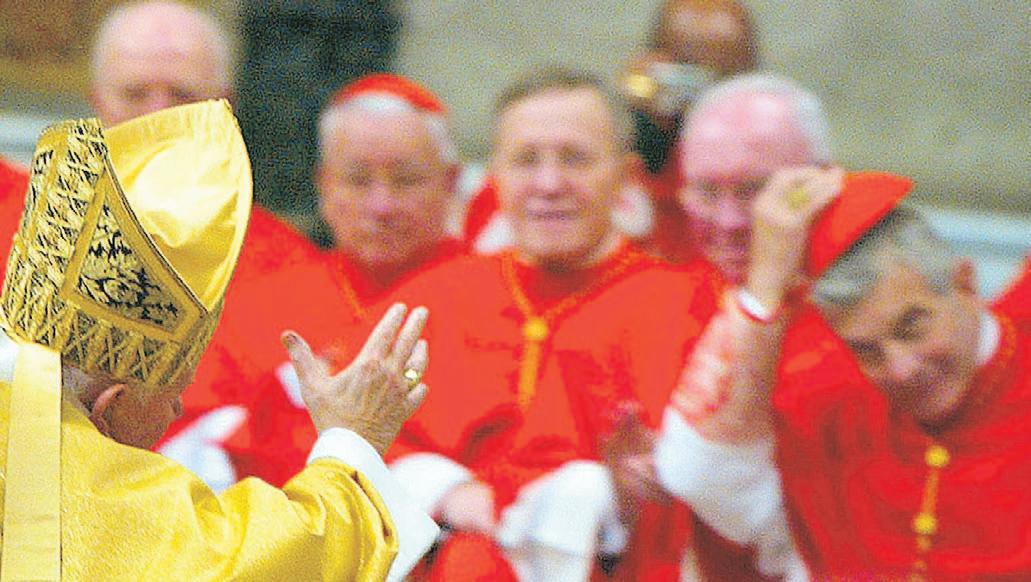
they knew one of the new Cardinals personally.
Charlie Mayberry, now a resident of Hamburg, Germany, was an altar server for Cardinal Okogie as a child at St. Dominic’s Church in Lagos.
Eddie and Carole Cannon of Edinburgh knew Cardinal O’Brien when he was head altar server at their parish.
“One curate warned the girls to keep their eyes off Keith, because he was destined for bigger things,” Eddie Cannon said. Father Emmanuel Kojo Antwi of Ghana, a student at the Biblical Institute in Rome, joined several planeloads of people who came from the West African nation to see Cardinal Peter Turkson elevated.
“I know him very well,” the priest said. “He taught me Hebrew in the seminary.
“We’re very proud of him, the first Cardinal in Ghana,” he said.
Father Filemon Zepeda of Mexico City said he’s known Mexico’s Cardinal Javier Lozano Barragan for 25 years.
“He’s a wonderful man, a good friend, very intelligent and passionate about his work,” Father Zepeda said.
Later that day, for two hours the general public was admitted to usually closed sections of the Apostolic Palace and several wings of the Vatican Museums to greet the new Cardinals.
A crush of people waited at the foot of the Royal Stairway, a Bernini-designed staircase between St. Peter’s Basilica and the papal apartments. When the Swiss Guards gave the word, the throng moved forward and into a series of rooms being used for the informal receptions.
The character of the gatherings around each Cardinal varied.
Cardinal Lozano stood at the middle of a chaotic swarm of Mexicans, as people
pressed forward for a moment with their new Cardinal.
People waited in a tidy line to greet French Cardinal Jean-Louis Tauran, who recently retired as Vatican assistant secretary of state for foreign affairs.
The crowd around Cardinal Okogie resembled a large party, growing larger and louder as new arrivals ran into friends and acquaintances and stayed to chat with them. Even Bishops and Cardinals seeking to pay their respects had to wait their turn and wade through the throngs.
Organisers tried to establish a one-way path to visit the new Cardinals. That meant squeezing past the massive number of visitors for Cardinal Tauran and Italian Cardinal Renato Martino, president of the Pontifical Council for Justice and Peace, around groups greeting 12 other Cardinals and through half the Vatican Museums to get to Swiss Cardinal Georges Cottier and Czech Cardinal Tomas Spidlik.
The last two were in the museums’ Lapidary Gallery, which has more than 3,000 ancient Christian and pagan inscriptions.
Cardinal Spidlik, whose work on the spirituality of the Christian East has contributed to Catholic-Orthodox dialogue, received a warm greeting from Cardinal Walter Kasper, the Vatican’s chief ecumenist.
“Eminenza,” Cardinal Kasper said in a booming voice with a broad smile on his face as he gave the new Cardinal a hug. “Congratulations.”
Cardinal Cottier, the theologian of the papal household, was seated near the door to his apartment and office, which one enters through the gallery. The gallery usually is opened only to scholars.
“I am at home here,” he said. Italian Cardinal Francesco Marchisano, archpriest of St. Peter’s Basilica and head of the office that oversees the basilica’s maintenance, also was not “borrowing” a reception room from the Pope. He
The Record 8 30 October 2003
greeted people at his office next to the basilica and even offered refreshments. - CNS
Pope John Paul II waves to cardinals at Mass in St. Peter's Basilica.
New Nigerian Cardinal Anthony Olubunmi Okogie of Lagos greets guests at the Vatican on October 21 following the consistory with Pope John Paul II.
Photo:CNS/Reuters
A baby kisses the crucifix of Italian Cardinal Tarcisio Bertone, Archbishop of Genoa, during a reception at the Vatican on October 23.
New Canadian Cardinal Marc Ouellet of Quebec embraces an unidentified Cardinal after receiving his red biretta during the consistory in St. Peter's Square.
Conservative views an attraction says Pell
Cardinal Pell says Church must present clear teachings
By Cindy Wooden
Preaching the message of Christ and clearly presenting Catholic teaching is the only way to guarantee the continued growth and fidelity of the Catholic Church, said Australia’s new Cardinal.
Just an hour after formally entering the College of Cardinals on October 21, Cardinal George Pell of Sydney said he did not need to receive a red hat from Pope John Paul II to feel vindicated for his support of traditional Church teaching.
“I think my stances are vindicated when they mirror the teachings of Christ and of the Catholic Church,” the Cardinal told reporters.
With his new red biretta sitting on a table crowded with microphones and tape recorders, Cardinal Pell said his new title would not make a great change in how he exercises his ministry in Australia.
He said he was and is called “to present Jesus Christ, the Catholic teaching, to try to strengthen the Catholic community and, equally importantly, to strengthen the Catholic contribution to Australian life.”
Like the Church in many parts of the Western world, he said, there has been “a slow erosion in Church practice” in Australia, with only about 18 percent of the nation’s Catholics going to church each week.
The way to change the situation, he said, is “to practise what we preach, and we have to work as well as we can so that the flame of faith will catch, especially in the hearts of young people.” The Catholic
faith is attractive to people when it is shown to clearly, fully and faithfully match what Christ taught, he said.
L i k e t h e C h u r c h i n m a n y
p a r t s o f t h e W e s t e r n w o r l d , h e
s a i d , t h e r e h a s b e e n “ a s l o w e r o s i o n i n C h u r c h p r a c t i c e ” i n
A u s t r a l i a , w i t h o n l y a b o u t 1 8
p e r c e n t o f t h e n a t i o n ’ s
C a t h o l i c s g o i n g t o c h u r c h e a c h w e e k
Cardinal Pell said Christian communities that promote traditional teachings and practices, offer real service and create genuine communities “are actually going better than those communities who have a much more liberal approach or radical approach. Many of those are just slipping away and dissolving.”
“A lot of people,” he told the reporters, “find it quite attractive to be conservative.” Strictly following Church teaching, he said, “works much, much better than the neo-pagan mix, which is superficially attractive.” The cardinal said the “neopagan mix” is “contemporary Western secularism” with its “very easy, slack rules on sexuality, suggestions that the question of God is irrelevant, very little regard for marriage and the family (and) very little regard for clear moral teachings.”
Such attitudes, he said, have led to “unhappiness” and have done nothing to assuage people’s thirst for meaning in their lives. When asked what he thought he would look for in a future Pope, the cardinal responded, “It would be wonderful if he was like the present Holy Father.” - CNS
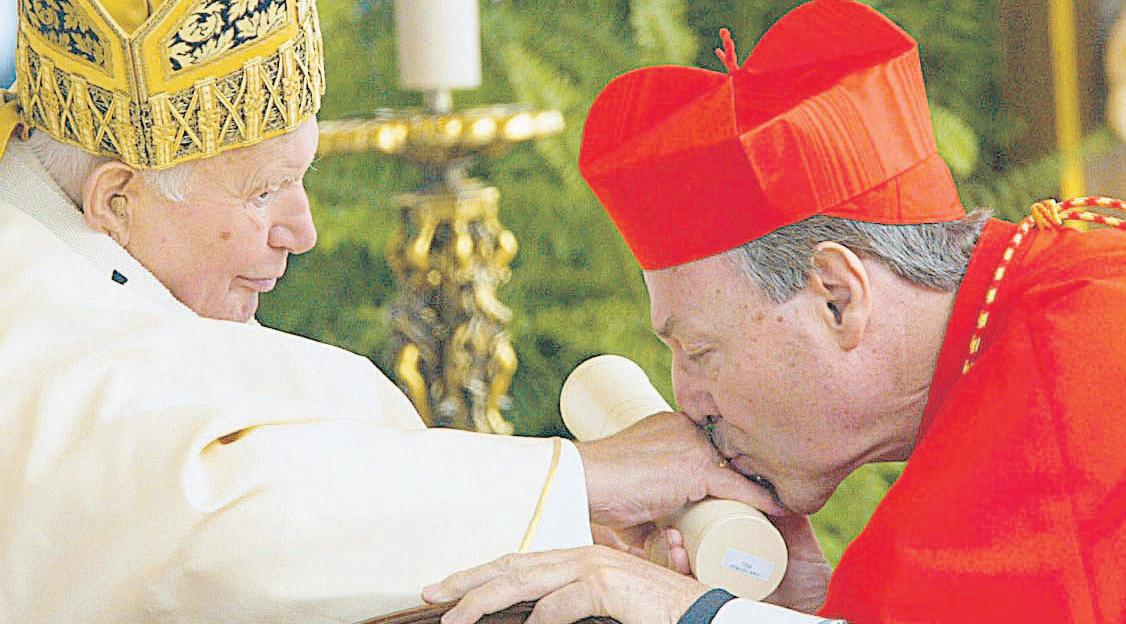
Cardinals represent sixty-eight countries
In addition to the 30 new Cardinals installed by John Paul II, there is one he named “in pectore” — secretly — who will not take part in a conclave unless his name is revealed.
The College of Cardinals now is made up of 194 Cardinals, including 135 under age 80 who could vote in a conclave for a new Pope.
All current elector Cardinals were installed in one of nine consistories convoked by John Paul II during his 25-year pontificate, with the exception of five, who received their cardinal’s hat from Paul VI.
Among Cardinals over age 80, 13 were created by Paul VI, one by John XXIII, the rest by John Paul II.
Among elector Cardinals, 66 are from Europe, 14 from North America, 24 from Latin America, 13 from Africa, five from Oceania. Elector Cardinals come from 58 countries; as a body the whole College of Cardinals proceeds from 68 countries.
If a conclave were called tomorrow, the countries most represented would be: Italy with 23 Cardinals; the United States with 11; Spain, Brazil and Germany with six each; Poland and France with five each; Mexico and India with four each; and Colombia, Canada and Australia with three each.
Only five non-Italian Cardinals took part in the conclave that elected Pius VII in 1800.
There were 51 in 1963, when Paul VI was elected, and 88 in 1978, when Karol Wojtyla was elected. Currently there are 112.
Countries with two elector Cardinals
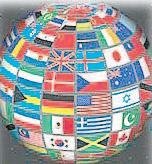
include Chile, Belgium, Slovakia, Portugal, the Ukraine, Great Britain, Hungary, the Philippines, Japan and Nigeria.
Countries with one elector Cardinal each include: Argentina, Nicaragua, the Dominican Republic, Cuba, Ecuador, Honduras, Peru, Bolivia, Guatemala, Austria, Switzerland, the Netherlands, Ireland, the Czech Republic, BosniaHerzegovina, Lithuania, Latvia, Croatia, Vietnam, Taiwan, Thailand, Indonesia, Syria, Angola, Cameroon, Mozambique, Congo, Uganda, Madagascar, Tanzania, Ivory Coast, South Africa, Sudan, Ghana, Samoa and New Zealand.
Cardinals who participated in the 1978 conclave that elected John Paul II number 111. Of these, 55 are from Europe, 19 from Latin America, 12 from North America, 13 from Asia and Oceania, and 12 from Africa.
European Cardinals constituted, and still constitute, 49%; Latin Americans have increased to 18% from 17%; those from Asia and Oceania to 13% from 12%; and Africans to 11% from 10%. North Americans have decreased from 11% to 10%.
-Zenit
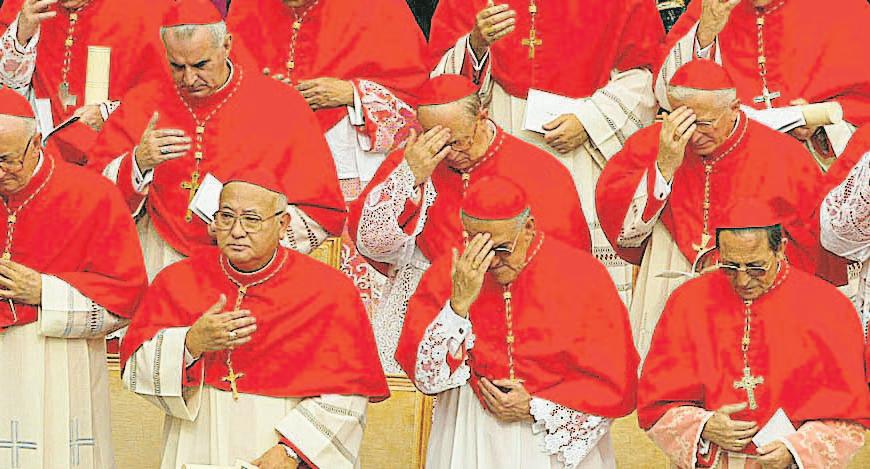 Photos:CNS/Reuters
Photos:CNS/Reuters
Cardinals must preach Gospel and serve others says Pope
Pope creates 30 cardinals, asks them to be 'fearless witnesses'
By John Thavis
In ceremonies that combined solemn tradition and the cheers of the faithful, Pope John Paul II created 30 new Cardinals and asked them to preach the Gospel "to all people, without exception" on every continent.
The liturgies on October 21-22 highlighted the international mix of the College of Cardinals, the group that will one day elect a new Pope. The Pope said the new
Cardinals reflected the "multiplicity of races and cultures that make up the Christian population."
He also created one Cardinal "in pectore," or in his heart, withholding publication of his name.
The Pope formally inducted the cardinals in a consistory held in a sunlit St. Peter's Square on October 21. The next day, he presented them with rings, sealing their special bond with the pontiff, during a Mass in St. Peter's Basilica.
In his sermon and prayers, the Pope emphasised the cardinals' special duty to preach the Gospel and serve others.
"Only if you become the servants of all will you complete your mission and help
the successor of Peter to be, in turn, the 'servant of the servants of God,'" he said in his consistory sermon, which was read by an aide.
From an altar area decorated with thousands of red and yellow tulips, he gazed out and waved to a crowd dotted with flags and banners from many countries.
"All of us were pleased to be here today, although there was a hint of sadness with the manifest decline of the Holy Father," Australian Cardinal George Pell said after receiving his red hat.
The liturgy included several time-honoured traditions. After pronouncing a profession of faith and an oath of obedience to the Pope, the cardinals came forward
and knelt one by one before the Pope, who handed them a four-cornered red biretta. The cardinals placed the birettas on their own heads.
The Pope explained to the cardinals that the red colour signified that "You must be ready to act with strength, unto the spilling of blood, for the building up of the Christian faith, for the peace and tranquillity of the people of God, and for the freedom and growth of the Holy Roman Church."
Pope John Paul also gave each cardinal a scroll assigning titular churches in Rome, symbolising the cardinals' status as members of the clergy of Rome and their relationship with him as Bishop of Rome.
The Record 30 october 2003 9
Australian Cardinal George Pell of Sydney kisses the hand of Pope John Paul II as he receives the document designating his new title during the consistory in St. Peter's Square October 21.
The church's newest Cardinals bless themselves as Pope John Paul II ends the consistory on October 21 in St. Peter's Square.
Blessed Mother Teresa
Pope thanks Mother Teresa for her friendship and calls her
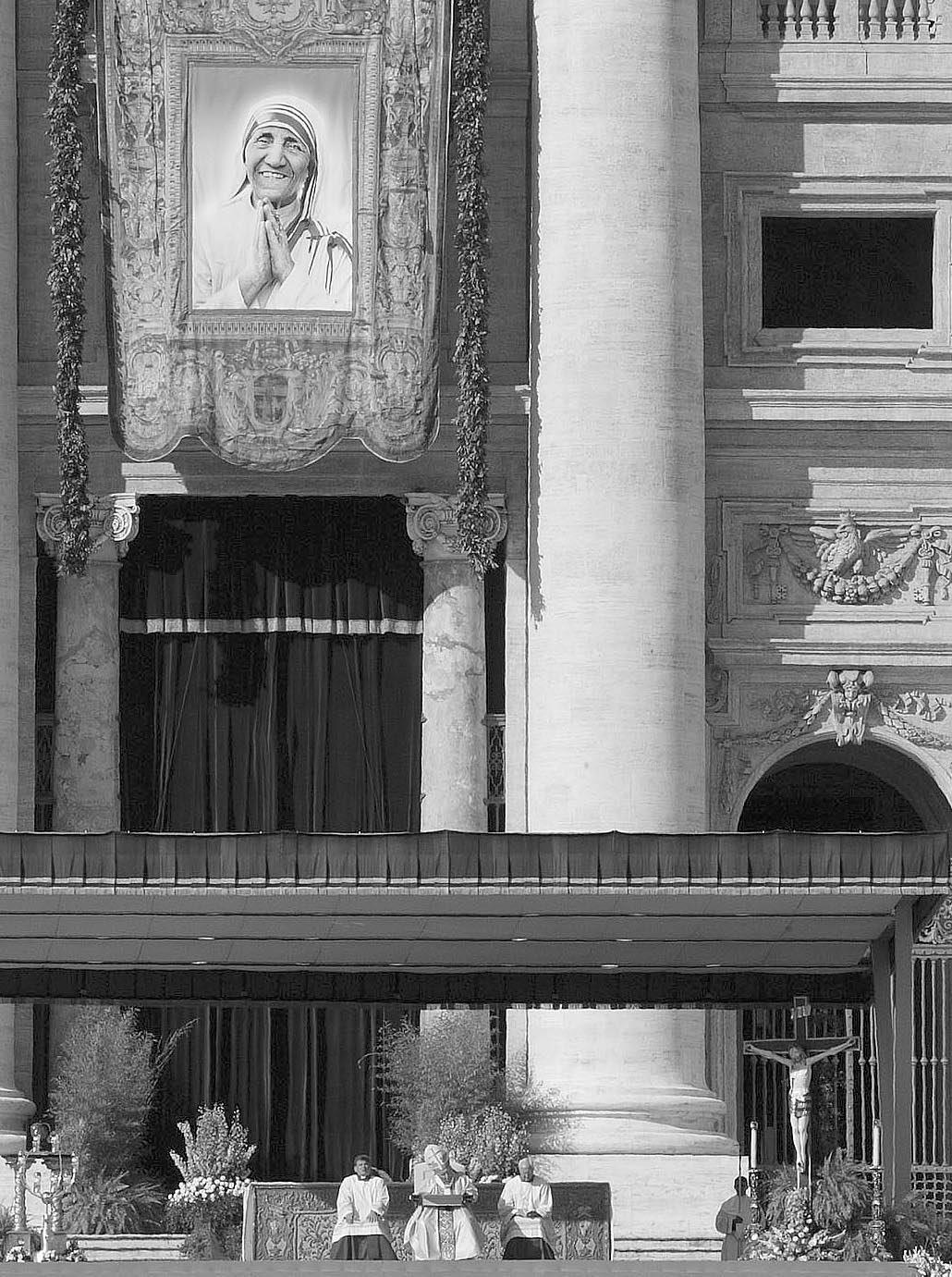 By Cindy Wooden
By Cindy Wooden
Pope John Paul II offered his thanks to Blessed Mother Teresa of Calcutta, founder of the Missionaries of Charity, for being close to him in her lifetime and for courageously showing the world what it means to love and serve Jesus completely.
"The venerable servant of God, Teresa of Calcutta, from this moment on will be called blessed," the Pope said at the beatification Mass on October 19 as the crowd burst into applause.
In the homily he wrote for the ceremony, the 83-year-old Pope said: "We honour in her one of the most relevant personalities of our age. Let us accept her message and follow her example."
For the first time at a major event, Pope John Paul did not read even one line of his own homily.
A Vatican official said that with the Pope's difficulty speaking clearly, the crowd would not have been able to understand much of his message, so others were asked to read for him.
St. Peter's Square and the surrounding streets were a crush of some 300,000 pilgrims and admirers of Mother Teresa.
Under a bright sun, which weather forecasters had said would not appear, the scene was awash with vibrant colours: flags from dozens of countries, banners in languages from Polish to Hindi, the bluetrimmed saris of the Missionaries of Charity, and the colourful traditional dress of Guatemalans and Nigerians.
In an unusually personal homily, read by a Vatican aide and by Indian Cardinal Ivan Dias of Mumbai, the Pope wrote, "I am personally grateful to this courageous woman, whom I always felt was alongside me.
"An icon of the good Samaritan, she went everywhere to serve Christ in the poorest of the poor. Not even conflicts or wars could stop her," the Pope wrote.
Mother Teresa was beatified in record time - just over six years after her death -
because Pope John Paul set aside the rule that a sainthood process cannot begin until the candidate has been dead five years.
Like the Pope, many people in the crowd knew Mother Teresa, volunteered in one of her homes or soup kitchens, or at least heard her speak when she came to their home towns.
I n a n u n u s u a l l y p e r s o n a l h o m i l y , r e a d b y a V a t i c a n a i d e a n d b y I n d i a n C a r d i n a l I v a n D i a s o f M u m b a i , t h e P o p e w r o t e , " I a m p e r s o n a l l y g r a t e f u l t o t h i s c o u r a g e o u s w o m a n , w h o m I a l w a y s f e l t w a s a l o n g s i d e m e
They carried official posters as well as their own photographs of the small, stooped nun who died in 1997.
Jack Griffith, 42, of Menasha, Wisconsin, was with a group doing a "saints pilgrimage" around Italy.
"For us, Mother Teresa is important because she is a saint of our own time," he said. "Her mission of mercy was among the poorest of the poor, and in that way she was countercultural.
"She shunned everything and focused on two things: Jesus in the Eucharist and serving the poor," Griffith said.
Before the Mass began, pilgrims swapped stories about when they met Mother Teresa or recounted tales of her audacity:
For example, when a bank offered her $1 million, she said it was not enough; she wanted $2 million.
Retired Australian Cardinal Edward I. Cassidy, former president of the Pontifical Council for Promoting Christian Unity, was among the attendees with a story.
He was a secretary in the Vatican
Esteem and affection build a friendship
Mother Teresa's rapport with Pope marked by friendship, admiration
By Patricia Zapor
When Pope John Paul II beatified Mother Teresa of Calcutta, he advanced the sainthood cause of a dear friend.
Blessed Mother Teresa, the Missionaries of Charity founder beatified on October 19, and Pope John Paul knew each other before he became Pope in 1978. In 1973, the two attended a eucharistic congress in Melbourne.
In his private notes from that time, then-Cardinal Karol Wojtyla of Krakow, Poland, mentioned that the presence of Mother Teresa at the congress, in a location close to the problems of the Third World, "was very significant; her congregation is actively involved in the problems of the poverty of that society."
Early in his pontificate, the two had a relationship such that Mother Teresa was welcomed in 1982 when she arrived at Castel Gandolfo, the summer papal residence, and interrupted a conver-
sation between the Pope and an Italian youth organisation.
News clips over the years paint a picture of the Pope and Mother Teresa's regular visits with each other, often with Mother Teresa leaving Rome with something she needed.
e g u l a r v i s i t s w i t h e a c h o t h e r , o f t e n w i t h M o t h e r T e r e s a l e a v i n g R o m e w i t h s o m e t h i n g s h e n e e d e d
In 1983, during a private Mass in his chapel, the Pope gave her the keys to a new car. In 1987, she was there as the Missionaries of Charity opened a hostel on Vatican grounds for the sick and destitute of Rome.
During a 1986 encounter at one of Mother Teresa's homes in Calcutta, India, the Pope greeted and touched 86 men and women, many unable to rise from their mattresses on the floor.
In an unscheduled talk outside
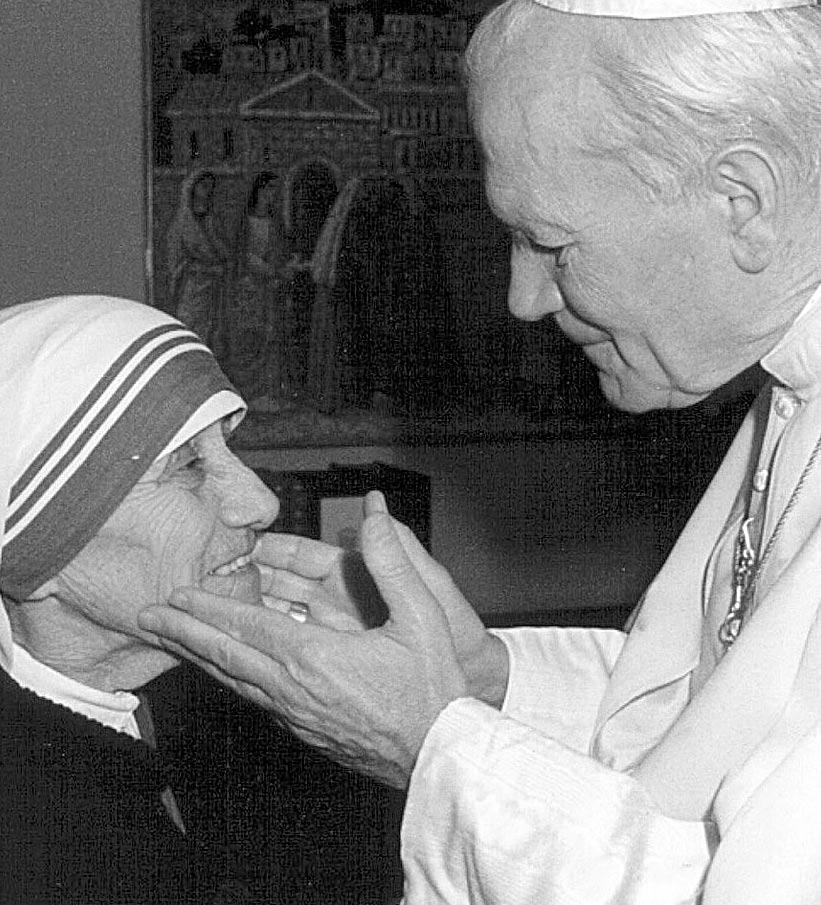
the house, Nirmal Hriday, the Pope called it a place of "anguish and pain," but also "a house built
of courage and faith."
Mother Teresa, standing at the Pope's side, told one Vatican offi-
cial, "This is the happiest day of my life."
Baltimore Cardinal William H. Keeler said he remembers observing the dynamics of the relationship between the two during the 1994 world Synod of Bishops on consecrated life.
"On several occasions she would be at the door, waiting for him to arrive, or would walk with him to the door," he said.
Cardinal Keeler also recalled Mother Teresa's last trip to Rome, a few months before her death in 1997: Although weak, she rose from her wheelchair to meet the Pope, and the two greeted each other with obvious affection.
In October 20 remarks to pilgrims who had come to Rome for Mother Teresa's beatification, Pope John Paul said, "I was tied to her by great esteem and sincere affection."
"Mother Teresa's whole existence was a hymn to life," he said. "Her daily encounters with death, leprosy, AIDS and every kind of human suffering have made her a forceful witness to the Gospel of life. Her very smile was a 'yes' to life, a joyful 'yes' born of profound faith and love, a 'yes' purified in the crucible of suffering."
The Record 10 30 october 2003
N e w s c l i p s o v e r t h e y e a r s p a i n t a p i c t u r e o f t h e P o p e a n d M o t h e r T e r e s a ' s r
Pope John Paul II presides at the beatification Mass for Mother Teresa of Calcutta on October 19 in St. Peter's Square.
Pope John Paul II greets Mother Teresa at the Vatican.
Photo:CNS/Reuters
Photo:CNS/Reuters
honoured by Pope
one of the most relevant personalities of our age
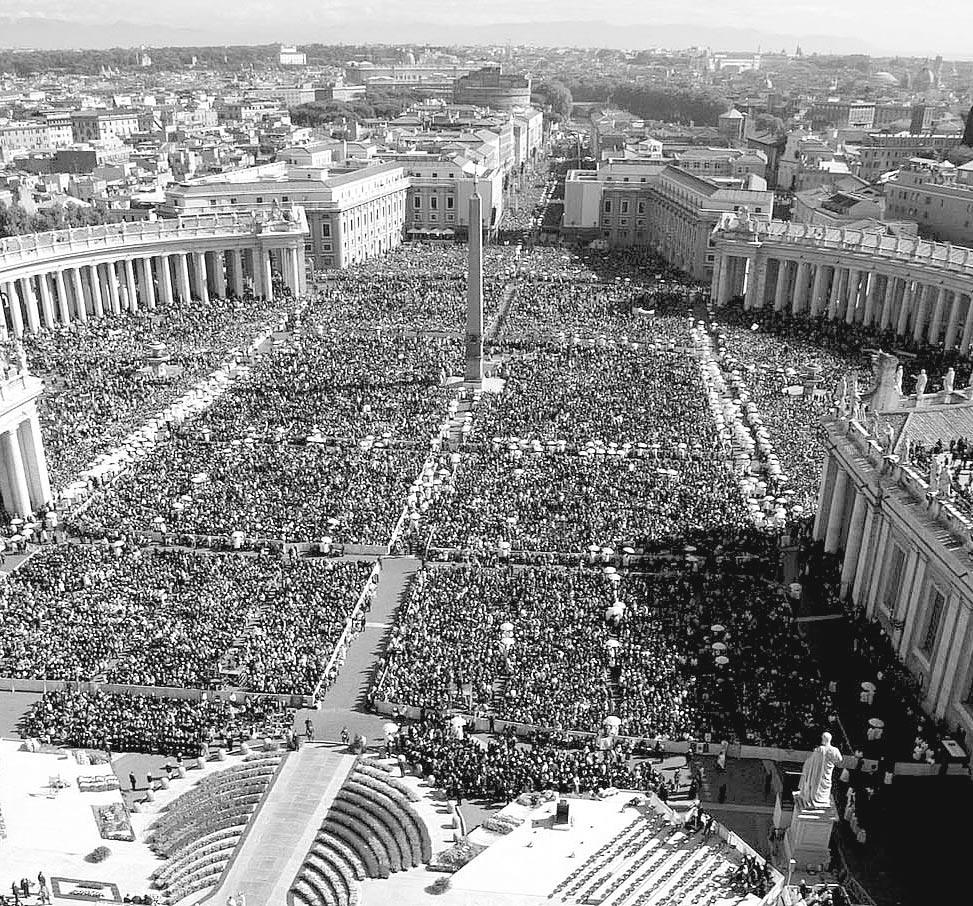
Embassy in India from 1955 to 1962, the early years of the Missionaries of Charity. "She was a frequent visitor," coming to inform the nuncio of her plans and occasionally asking for help, he said.
"The nuncio and I kept saying, 'Go slowly. You are building for the future, build solidly,'" the Cardinal said.
Cardinal Cassidy returned to Calcutta, India, in 1975 to celebrate Mass with Mother Teresa and her sisters to mark the 25th anniversary of the Missionaries of Charity.
"She said, 'Remember when you used to tell me to go slowly? I always went away thinking, 'You'd think the representative of the Holy Father and his secretary would have more faith.' That was her little dig at us," the Cardinal said.
The congregation at the beatification Mass included official delegations from the Orthodox Church of Albania, Albania's Sunni and Bectascian Muslim communities, and from 26 governments, including the United States, the Canadian province of Quebec, India, Albania and Macedonia.
A feminine genius
Focolare founder praises the new Blessed
If anyone exemplified the "feminine genius" so praised by the Pope, it was Mother Teresa.
So says Chiara Lubich, the founder of the Focolare Movement and a friend of the newly beatified nun.
After proclaiming Mother Teresa Blessed on Sunday, John Paul II said in his homily that, in giving herself to God and to her neighbour, the religious met with "great fulfillment and lived the most noble qualities of her femininity," becoming a "sign of the love of God." That same day, Lubich reminisced about Mother Teresa, saying that the nun had "something that Mary characteristically personified. She was not invested with a ministerial position. She was invested with love, with charity, the greatest gift, the greatest charism heaven created."
Lubich said she last met Mother Teresa in New York in May 1997, a few months before her death.
In a message on the Focolare
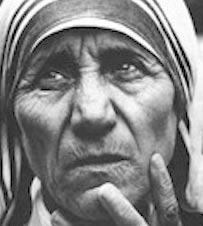
Web site, Lubich says of the newly beatified: "For us she is a model. In fact, she is the admirable teacher of the art of loving."
Mother Teresa "truly loved everyone. She didn't ask people whether they were Catholic or Hindu or Muslim. They were people and in that humanity rested all their dignity," Lubich continues. The new Blessed "took the initiative in loving. She went out to look for the poorest of the poor. She had, in fact, been sent by God for them."
"Perhaps more than anyone else," she adds, Mother Teresa
Aferdita Berisha, 35, a Muslim from Kosovo, said: "All the good things Mother Teresa did cannot be divided according to faith. She helped everyone who needed help, regardless of religion."
Several royal guests were seated not far from 2,000 people who eat or sleep at the missionaries' facilities in Rome.
The royals included Queen Fabiola of Belgium, Princess Mona of Jordan, Princess Elena of Romania and Prince Emanuele Filiberto of Savoy, the former Italian royal family.
In his homily, Pope John Paul wrote that Mother Teresa's life was "a radical living and a bold proclamation of the Gospel."
"Her life is a testimony to the dignity and the privilege of humble service," he said. "Her greatness lies in her ability to give without counting the cost, to give 'until it hurts.'"
Pope John Paul appeared to be doing the same thing. What little he read during the Mass, he read with great strain.
But after Mass, he stayed on the stage for 20 minutes greeting members of the official delegations, then rode through the massive crowd in an open Popemobile.
The Pope met on October 20 with Sister Nirmala Joshi, Mother Teresa's successor as superior of the order, and with hundreds of Missionaries of Charity and pilgrims who had come to Rome for the beatification.
Mother Teresa, he told them, "was one of the greatest missionaries of the 20th century," a missionary who preached the Gospel around with world "with daily gestures of love for the poorest."
Mother Teresa was born to Albanian parents in 1910 in what is now Macedonia; in 1946, she experienced a call to found the Missionaries of Charity and live among the poorest of the poor in Calcutta.
Mother Teresa -- always smiling -- rapidly expanded the order and opened hospices, clinics and shelters around the world, but her letters to her spiritual directors express a feeling that God had aban-
"recognised the presence of Jesus in them. 'You did it to me,' was, in fact, her motto."
L u b i c h s a y s o f t h e n e w l y b e a t i f i e d : " F o r u s s h e i s a m o d e l I n f a c t , s h e i s t h e a d m i r a b l e t e a c h e r o f t h e a r t o f l o v i n g "
The Focolare founder says that the diminutive Albanian nun "undoubtedly loved her enemies. She never wasted time responding to the absurd accusations made against her. Instead she prayed for her enemies."
"After her death I learned even more about her and I eagerly read books about her," Lubich recalls.
"I admired Mother Teresa especially for her determination. She had an ideal: the poorest of the poor. And she remained faithful to it. Her whole life was aimed in that direction. In this aspect too she is a source of inspiration to me to remain faithful to the ideal that God has entrusted to me."
doned her.
"Mother Teresa shared the passion of the Crucified One, particularly during her long years of 'interior darkness,'" the Pope wrote in his homily. "In the darkest hours, she clung with even greater tenacity to prayer before the Blessed Sacrament.
"This harsh spiritual struggle allowed her to identify even more with those she served every day, experiencing the pain and even rejection they felt," he wrote.
Retired Cardinal Ersilio Tonini of Ravenna-Cervia, Italy, told Italian television: "She was strong. She commanded. She knew how to organise. She was very intelligent.
"Often we think of saints as people who are half-stupid, who go around in a fog," he said. "Mother Teresa was real, practical. She had great courage."
The people participating in the processions, readings and dances at the Mass included active and contemplative nuns, contemplative brothers and priests belonging to the various branches of the Missionaries of Charity, as well as lay coworkers and children adopted from the Missionaries' orphanages.
As a brother carried a reliquary containing some of Mother Teresa's blood to the altar, 10 young Indian girls in goldtrimmed white saris danced in procession; the girls were adopted by Italian families.
Maria McMurtrie and her mother, Sandy, of Bethesda, Maryland, represented the Americas in the offertory procession, carrying a painting of Our Lady of Guadalupe with the Pope and Mother Teresa.
Sandy McMurtrie adopted Maria, who has Down syndrome, from a Missionaries of Charity orphanage in Mexico. Mother Teresa was Maria's godmother.
After the Mass, the 2,000 poor who were special guests at the Mass were offered a luncheon in the Vatican's audience hall. In a simple setting, with chairs but no tables, they ate lasagna, chicken, peas, bananas and dessert. -CNS
A white and blue habit
All the Missionaries of Charity wear the same white-and-blue habit that Mother Teresa made famous worldwide.
The sari is the dress worn by Indian women. Those from wealthy families can spend much money on their dress. The value of the sari worn by Mother Teresa's daughters,
however, lies in the hands of those who make them.
All the Missionaries' saris are made by patients in the Prem Nivas leprosy centre in Titaghar, north of Calcutta. The centre was started on January 14, 1959. It was dedicated to Mohandas Gandhi in 1975.
Those who work with the looms in Titaghar have been cured of leprosy, though the disease has left its mark on their bodies. This is what gives the Missionaries' saris an inestimable value, say Mother Teresa's religious.
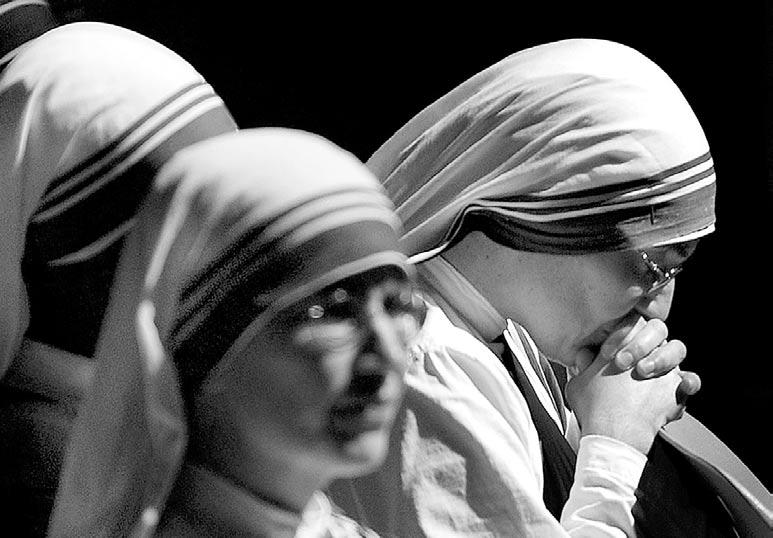
The Record 30 october 2003 11
About 300,000 people turned out for the joyful ceremony of beatification of Mother Teresa
-Zenit
Mother Teresa
Putting his
trust God’s hands
At anniversary Mass, Pope prays for 'wisdom, holiness, strength'
By John Thavis
Beneath the balcony where he amazed the world on the night of his election in 1978, Pope John Paul II celebrated a 25th anniversary Mass and prayed for the "wisdom, holiness and strength" to keep leading the church.
Alluding to his physical difficulties, he asked for continued prayers and support from Catholics all over the globe and said he meditated daily over his ability to meet the demands of the papacy.
"I renew, through the hands of Mary, beloved mother, the gift of myself, in the present and the future: All will be accomplished according to your will," he said in a prayer to Christ, the Church's "good shepherd."
Concelebrating on a crystal clear evening on October 16 in St. Peter's Square were more than 250 cardinals and bishops from more than 120 countries, most of whom have taken office under Pope John Paul and helped him shape the modern church.
The liturgy in St. Peter's Square was joyful and poignant, a celebration of what the Pope has accomplished in 25 years and a reminder of how much his physical strength has slipped.
Youthful and energetic when he greeted the world on October 16, 1978, the 83-yearold pontiff had to be wheeled on a chair to the altar for the anniversary celebration and struggled to pronounce the Mass prayers.
Sitting in a spotlight under a canopy, his head tilted forward under a brocaded gold mitre, he glanced out at the crowd and smiled as visitors waved caps, flags and scarves in tribute. Emotions in the crowd ran high.
"I'm 26 years old, and I've followed him all my life. I see Christ in him," said Rome resident Cecilia DiCarlo with tears running down her cheeks.
"He invites everyone to be Christian, even when it is difficult. He knows how difficult this is for young people, and that is so special, especially from someone his age. I could not help but be here," she said.
In his sermon, the Pope spoke movingly of his initial decision to assume the papacy and referred indirectly to his more recent struggles to carry the burden of his ministry.
When he was asked to accept the papacy, he said, he recalled the Gospel account of how Christ, before entrusting the papacy to St. Peter, persistently asked him, "Do you love me?"
"Every day the same dialogue between Christ and Peter takes place inside my heart. In spirit, I fix on the benevolent gaze of the risen Christ," he said.
"Although he is aware of my human fragility, he encourages me to respond with trust like Peter did: 'Lord, you know everything. You know that I love you.' And then he invites me to assume the responsibilities that he himself has entrusted to me," he said.
In a section of his sermon read by an aide, the Pope made it clear that the
prayers of Catholics help him carry on his ministry.
"God alone knows how much sacrifice, prayer and suffering have been offered up to support me in my service to the church," he said.
"I beg you, brothers and sisters, don't interrupt this great work of love for the successor of Peter. I ask you once again: Help the Pope ... to serve man and all humanity," he said.
Introducing the prayer of the faithful, the Pope asked that God "continue to pour upon me the Holy Spirit, the spirit of wisdom, of holiness and strength, in order to serve his holy people and proclaim to all people the Gospel of salvation and peace."
The square was packed with about 50,000 people, including some who had stood in the same spot 25 years earlier and applauded the election of the first nonItalian Pope in 455 years. One of them was Cardinal-designate Justin Rigali of Philadelphia.
"I was here the day they announced his election. He was filled with energy, filled with dynamism, and 25 years later it's gone, but he bears the burdens of old age with remarkable dignity," he told reporters.
Today, the Pope's reign has become the fourth-longest in history and has left a defining mark on the Church and the world beyond its borders.
"This is the man God has sent to teach a lesson to the whole world. He's brought a lot of changes not just to the Catholic world, but to the whole world today," said Nigerian Father Celestine Chigboh, who was videotaping the Mass.
Among those in the predominantly
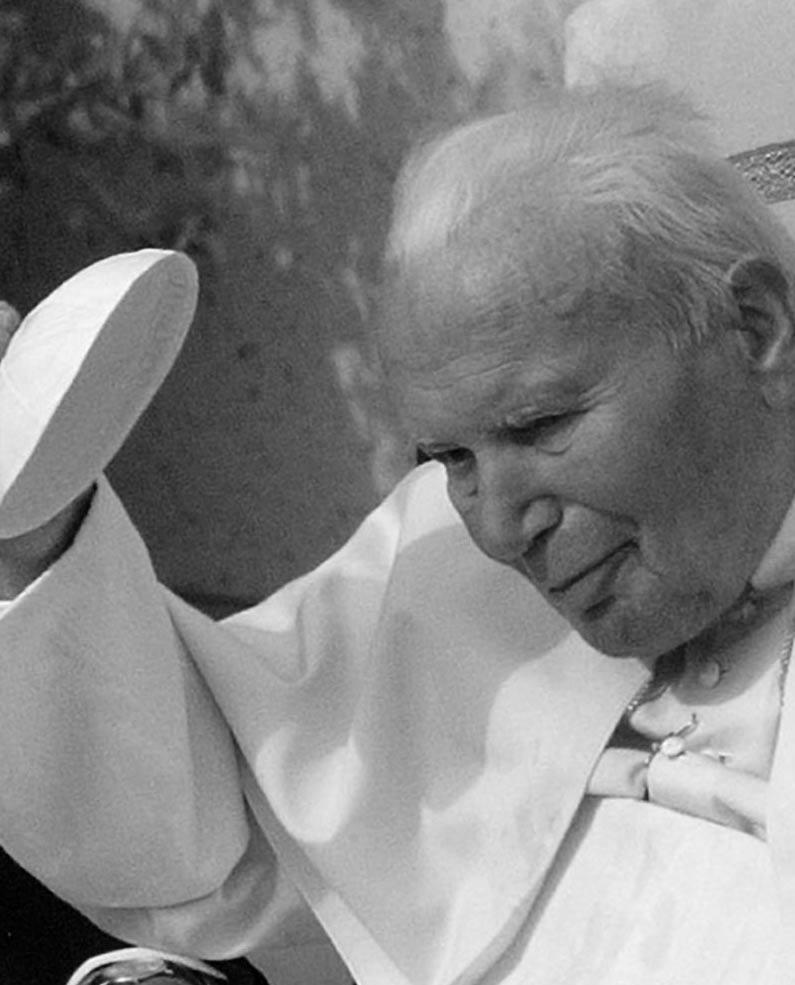
Catholic crowd were well-wishers from other faiths, who felt a special bond with a Pope who has reached out to them.
"I came to this celebration because for Christianity he is a good man. He has done so much for relations between churches and for peace. Truly he is a man of God," said Father Ciprian Vasile Cucu, a Romanian Orthodox priest studying in Rome.
The liturgy was designed around the theme of the Good Shepherd and highlighted several main themes of Pope John Paul's pontificate: evangelisation, personal
Church doesn’t govern “with a tongue”
Cardinals say Pope's speech problems do not affect ability to govern
By Cindy Wooden
The difficulty Pope John Paul II has speaking and the possibility that one day he will not be able to speak at all do not threaten his ability to govern the church, a Vatican official said.
"The church does not govern with the tongue, but with the head and with the heart," said Cardinal Jose Saraiva Martins, prefect of the Congregation for Saints' Causes.
The cardinal spoke on October 16, the 25th anniversary of Pope John Paul's election, after a ceremony at which the Pope read only the first and last thirds of his prepared text.
For months, the Pope has been shortening the length of his speeches and, especially since mid-September, has been allowing aides to read major portions of the prepared texts.
When he does read, the Pope's voice is often weak, his speech slurred and his breathing laboured -- all signs that his neurological disease, believed to be Parkinson's, is progressing.
Cardinal Saraiva Martins said that in
governing the church with his head and heart, "This Pope is still perfect." Cardinal Lubomyr Husar of Lviv, head of the Ukrainian Catholic Church, said he recently met with the Pope, and he is certain that the Pope "is spiritually strong and acute in his perception and reaction" to what is being discussed.
"One thing anyone who has been in touch with the Pope in the last weeks knows is that as for his spiritual and intellectual forces he is in great shape," the Cardinal told Catholic News Service.
"He is perfectly on par when listening and responding, although his voice is not always clear," he said.
Los Angeles Cardinal Roger M. Mahony said while the Pope's infirmities may limit him they do not affect his ability to govern.
"Certainly the Pope is very much in control," Cardinal Mahony told reporters in Rome on October 15.
"Is he managing all aspects of the church as he used to? Of course not. No one expects that."
Instead of being deeply involved in the details of the Vatican as he once was, Pope John Paul is focusing on his role as shepherd of a flock, the Cardinal said. "Right now his message is all pastoral," he said. -CNS
holiness, forgiveness and faith in action.
Before the Mass began, Scriptural quotations and excerpts from papal documents were read to encapsulate some of the more important themes: the Pope's teaching on women, his devotion to Mary, his globetrotting ministry as an "apostolic pilgrim," his ecumenical initiatives, his efforts to spur vocations and his insistence on preaching the Gospel as the basic duty of the faith.
The Mass began with a litany of the saints, many of whom were proclaimed by Pope John Paul. The Gospel reading recalled St. Peter's advice to the church's bishops: "Do not lord it over those assigned to you, but be examples to the flock."
The prayer intentions in six languages, including Swahili, underscored the church's internationalisation in recent years and the Pope's efforts to highlight the Church's universal gifts.
Cardinal Joseph Ratzinger, prefect of the Congregation for the Doctrine of the Faith, read a short tribute to the pontiff at the beginning of the Mass. He said the Pope had travelled the world preaching the reconciliation of the Gospel.
"You have addressed young and old, rich and poor, the powerful and the humble, and have always demonstrated -- following Christ's example -- a particular love for the poor and defenceless, bringing to all a spark of God's truth and love," the cardinal said.
"You have taken on insults and criticisms, but at the same time provoked gratitude and love and made the walls of hatred and estrangement fall," he said.
After distributing Communion, the Pope looked tired and slumped in his throne. He perked up to read final greetings in eight languages, to the delight of the crowd. In English he said, "Thank you for the affection which you have shown toward the successor of Peter."
As Vatican and Polish flags waved in the breeze, the choir sang a final song, "Tu Es Petrus" ("You Are Peter"), and the pontiff was wheeled back into the Vatican to rest up for a heavy schedule of anniversary events over the following days. -CNS
The Record 12 30 October 2003
Pope John Paul II acknowledges the cheers of pilgrims at his weekly general audience in St. Peter's Square on October 15.
in
Photo:CNS/Reuters
A job for the Holy Spirit
Papal biographer calls Pope John Paul II a hard act to follow
By Elaine Spencer
The next time the world’s cardinals meet to elect a Pope, they will face “a long and difficult process” because the current pontiff’s accomplishments will be impossible to match, papal biographer George Weigel said in a lecture on October 7.
“You are not going to be able to top the most influential Pope to come along in 500 years,” Weigel told about 175 people gathered at St. Vincent de Paul Parish Hall in Peoria.
He said one of the biggest tasks facing the next Pope will be “helping the church digest” the teaching and vision of Pope John Paul II.
“We have not yet scratched the surface” of all of Pope John Paul’s ideas, he added.
Weigel is a syndicated columnist in the Catholic press and author of the massive 1999 biography of Pope John Paul, “Witness to Hope.”
While the 25th anniversary of his election this October has prompted numerous retrospectives on Pope John Paul’s reign, Weigel said his papacy “continues to unfold in a dramatic way” as he struggles with illness and old age.
He said the 83-year-old pontiff is “reminding the world that there are no disposable human beings”
and “visibly walking the Way of the Cross before the world, all the way to the end.”
He devoted most of his talk to the 10 accomplishments of Pope John Paul’s pontificate that he believes are “securely established” in history. They are:
● Transforming the papacy from a “bureaucratic” to a pastoral office. After this Pope, the church will never “go back to the idea of the Pope as (its) chief bureaucrat,” he said.
● Recognising that the primary aim of the Second Vatican Council was spiritual renewal, intended, in the Pope’s view, “to propose Jesus Christ as the answer to the question that is every human life.”
“Nearly every seminary candidate he has met during this pontificate has, in some way, chosen to embrace the priesthood because of Pope John Paul and his vision of the faith”
● Defeating European communism, not as a statesman or diplomat, but as a pastor, providing Poles and others in Eastern Europe with spiritual “tools of resistance that the communists could not match.”
● Recognising that a false concept of freedom — disconnected from its necessary underpinning of moral truths — would be the next great threat to democracy after communism.
● Keeping genuine ecumenism
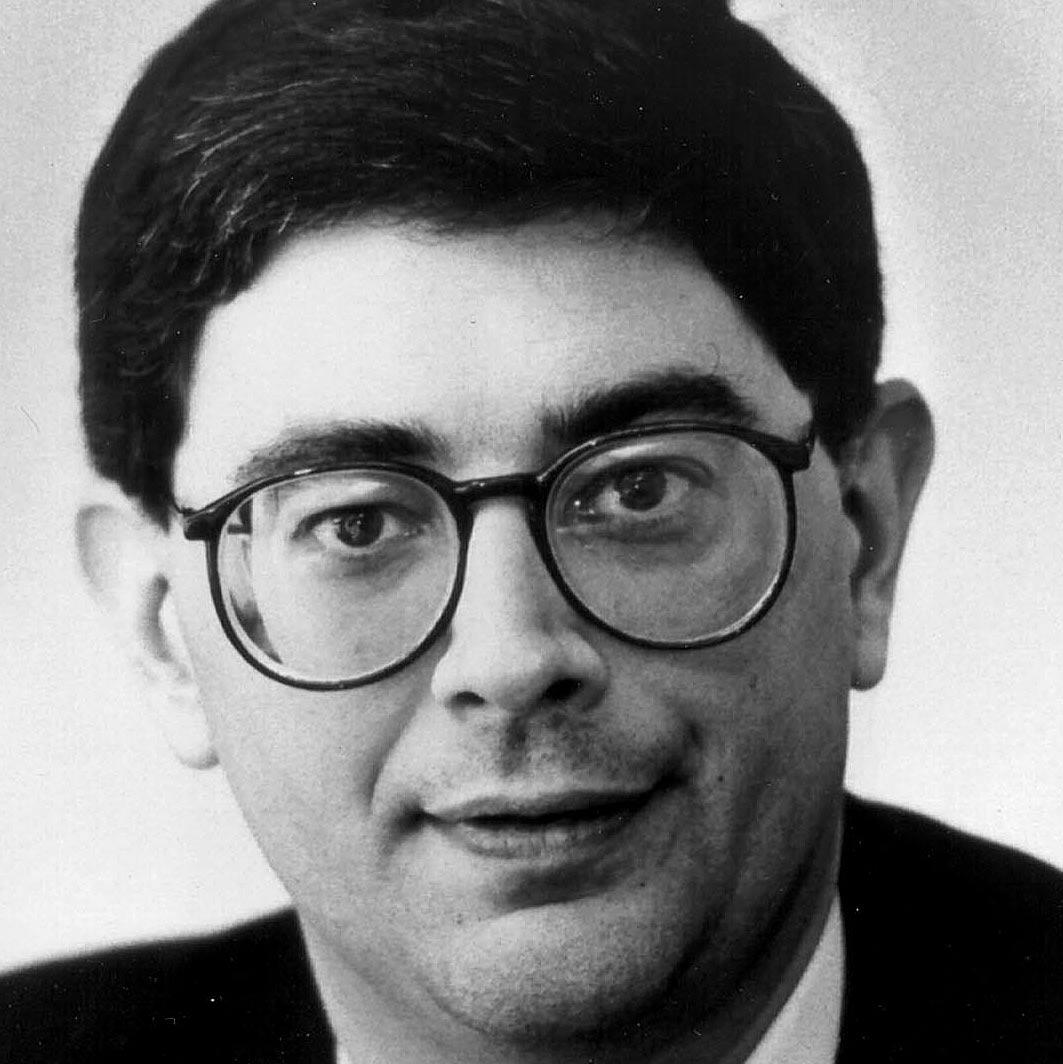
— the quest for “unity in truth” among all Christian denominations — alive.
● Historic breakthroughs in Jewish-Catholic relations that have helped to “clear the debris” of the “tortured and painful relations” of the past, opening the way for a new theological conversation between the two faiths.
● Rescuing dialogue with Islam, Buddhism and other world religions from a “sandpit of political correctness” that seeks to achieve tolerance by ignoring or downplaying differences between world religions instead of facing them openly with mutual civility and respect.
Thanks for the memories
Nun's book captures 'extraordinary' 25 years of papacy
By Kate Blain
Aveteran communicator, Mercy Sister Mary Ann Walsh knew that her press packet had to be extraspecial to stand out in the deluge of information that would surround Pope John Paul II's 25th anniversary -- so she made it into a book.
"John Paul II: A Light for the World," a 256-page "pictorial documentary," was published by Sheed & Ward in October to coincide with the papal silver jubilee, but pre-publication sales passed the 30,000 mark.
In August Publishers' Weekly said it "may be the pick of the crop" among new books on the Pope.
Sister Walsh, who edited the book, is deputy director for media relations for the U.S. Conference of Catholic Bishops in Washington. In putting the volume together, she said, she wanted to "give a picture of this papacy without any political skew."
"We're at an extraordinary moment in history," Sister Walsh told The Evangelist, Albany (New York) diocesan newspaper. "I wanted to give a fair picture of what has happened over the past 25 years. I was struck by what a major force the Pope has
been in the geopolitical world; the places the Pope has visited have been beyond the major cities on everybody's agenda."
It seemed like everyone who had ever met the Pope wanted to write something for the book. When Sister Walsh chose her writers to cover issues from interfaith relations to families and limited them to 400 words each, she said jokingly that "screams could be heard all over the East Coast."
Those chosen to write anecdotes about their personal experiences of Pope John Paul's "human side" were limited to 150 words. Even with those restrictions, the book nearly doubled in length before its publisher, Sheed and Ward, begged Sister Walsh to stop accepting submissions.
She said she was surprised by the number of people whose favourite anecdote about the Pope involved humour.
In one essay, for example, Archbishop Daniel E. Pilarczyk of Cincinnati recalled mischievously scolding the Pope, a fellow Pole, for allowing the archbishop's last name to be misspelled on his place card when he and some other U.S. bishops were invited to a meal with the Pope.
"The bishops in the group were aghast," Archbishop Pilarczyk said, but the Pope just smiled and shot back, "If you want to make a protest, you have to take it to the secretary of state first. We all have to follow procedures."
Sister Walsh said that among her
● Calling attention to the importance of human life issues — which Weigel described as “absolutely crucial to the survival of democracy.”
● Developing the “Catechism of the Catholic Church,” a crucial tool for the church’s faith response to modern secularism.
● Providing personal inspiration to millions of believers, not only with his words but through his personal witness that has motivated countless people to change their lives.
As an example of the influence of the Pope’s personal charisma, Weigel said that nearly every seminary candidate he has met
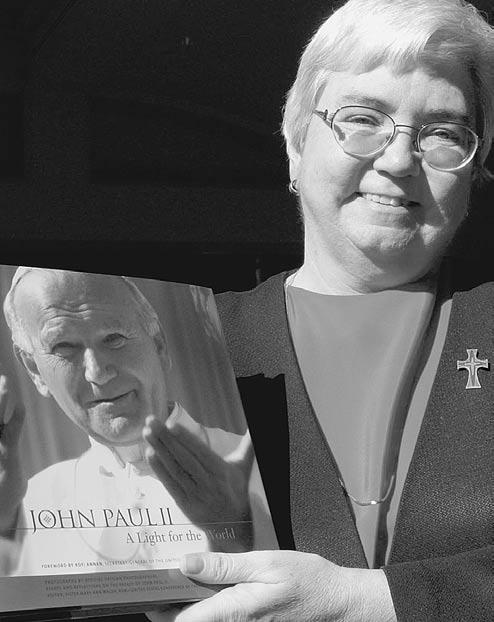
favourite anecdotes in the book was one by Cardinal Roger M. Mahony of Los Angeles, who recounted leaving the Pope alone for a moment before dinner at the cardinal's residence and returning to find him missing -- then discovering that the Pope was in the kitchen, serving himself a bowl of soup.
"On a papal visit, you want everything to be perfect," Sister Walsh said. Losing the Pope "would send panic through you!"
Sister Walsh was a member of the Vatican press corps from 1983 to 1986 as a reporter with Catholic News Service (then National Catholic News Service) and was communications director for the 1993
during this pontificate has, in some way, chosen to embrace the priesthood because of Pope John Paul and his vision of the faith.
When the world’s cardinals gather to select Pope John Paul’s successor, Weigel said, they will look for someone who “radiates a sense of conviction and holiness” and has at least some of the current pontiff’s public charisma.
Since the College of Cardinals is a much more complex and diverse body than it used to be, Weigel predicted that the next papal election will not come to a quick conclusion.
“It will be the most open conclave in history, and nationality will mean virtually nothing,” he added.
In a similar lecture the day before at the University of St. Thomas in St. Paul, Minnesota, Weigel also cited the Pope’s accomplishments and spoke about the unfinished business of his papacy.
Despite the Pope’s great influence, he said, his teachings on the theology of the body, laid out in a series of Wednesday audience addresses over a five-year period, have not yet permeated Catholic thinking. The Pope’s vision of the church as an evangelical movement, rather than as primarily an institution, also has failed to take deep root, especially in Western Europe, Weigel said.
“It is perhaps the greatest failure of this pontificate that it has not been able to ignite in the historic heartland of Catholicism a new evangelical idea of the church,” he said.
World Youth Day, when the Pope visited Denver.
In one of the book's essays she writes about the Pope's special connection with young people. She said she believes that Pope John Paul is the only world leader to reach out to youths so much.
"He has great capacity to be present to people" in general, she added. Papal synods, for instance, last for a month and involve hundreds of people, but she has seen the Pope invite about 10 people to dinner every night during the synods.
"He would know something about everyone at the table," she added. "He knows what touches people."
The photos in the book are stories in themselves. Pope John Paul's physical decline is evident in the book's photos, which range from shots of a vibrant pontiff taken at the beginning of his papacy to recent pictures showing a stooped, fragile man.
"We wanted to make sure we had pictures of him with a cane: Just because you walk a little slower doesn't mean your reach isn't just as far," Sister Walsh said. The book's first press run was 50,000 copies. Sister Walsh said publishers in several other countries are expressing interest in it as well.
In her own interactions with one of the longest-reigning Popes in history, she said, what has struck her most is "the graciousness of the man, the holiness of the man."
"John Paul II: A Light for the World" costs US$35. It can be ordered on the Internet at: www.rowmanlittlefield.com.
The Record 30 october 2003 13
Papal biographer George Weigel
Sr Anne Walsh with a copy of the book she edited. Photo:Cns/Rueters
Reviews
R E A D I N G
T h e
W a y s i d e S t r e a m R e c o n c i l i a t i o n
Fr P aul Glynn
By Debbie Warrier
Sydney based Marist Father Paul Glynn’s book The Wayside StreamReconciliation is a collection of stories that features repentance and reconciliation.
Drawing on well researched facts and using Biblical references, Fr Glynn attempts to heal some of the spiritual wounds of our times.
Fr Glynn’s observations of the cultural division between the World War II allied forces and the Japanese are made with the clear intention of bridging the gap. He recreates for readers that era and the
Australia’s influential first Cardinal, Patrick Moran, still has no biographer. It is remarkable that this gap exists amongst the full-length biographies of a good number of Australian Archbishops and Bishops. It is even more intriguing when we learn that in 1931 the Australian Bishops commissioned Fr Eris O’Brien, then a developing historical writer, to write a biography of Cardinal Moran.
During his career from the 1920s to the 1960s Eris O’Brien became well known as a parish priest, historian and author, confidant of bishops, diplomats and prime ministers, and Archbishop of Canberra and Goulburn.
As a historian he is particularly remembered for The Life and Letters of Archpriest Therry (1922), The Dawn of Catholicism in Australia (1928) and The Foundation of Australia (1937). Eris O’Brien’s early work on a biography of Cardinal Moran is followed in an article entitled Eris O Brien: Historian and
Hal Colebatch
Iwas very interested to read the article by Guy Crouchback in the current issue of The Record on contemporary poetry.
There was, however, one notable omission from the list of West Australian poets and that was Hal Colebatch. I hope he wasn’t excluded purely because he is not a Catholic. After all, other non Catholics –for example, Andrew Lansdown (a Baptist minister) - were mentioned.
Incidentally, three prominent Catholic poets – Vincent Buckley, Bruce Dawe and Kevin Hart – were inexplicably omitted from the list of other Australian poets!
D r C r o s o g
East Fremantle

The Catholic perspective on popular culture
socio-political framework on which it hinged. According to Fr Glynn, it is only by all parties accepting responsibility for their individual actions that true peace can be achieved.
C h a p t e r s a r e d e v o t e d t o t h e
b i o g r a p h i c a l a c c o u n t s o f t h o s e
w h o h a v e s o u g h t t o e n d t h e
a f t e r m a t h o f v i o l e n c e , b y s e e k i n g f o r g i v e n e s s
In the spirit of Vatican II, Fr Glynn’s writings show a devotion to the Scriptures, and an appreciation for the wisdom of other religions.
Chapters are devoted to the biographical accounts of those who have sought to end the aftermath of violence, by seeking forgiveness. Fr Glynn advocates the belief we are all called to holiness and he illustrates his point with the lives of holy people. High profile figures of this calibre are featured, though predominantly it recounts the lives of the laity that are changed by critical life events and healed by reconciliation.
On October 4, Fr Glynn officially
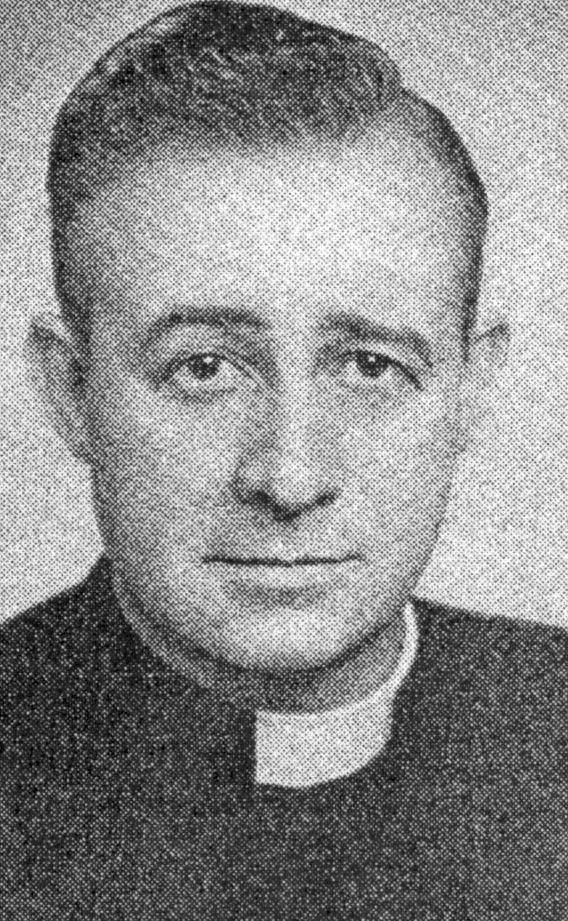
Scholar in the 2003 edition of the Journal of the Australian Catholic Historical Society The writer, Elizabeth Johnston, focuses on the academic life of O’Brien and shows how his research interests
launched his new book at God’s Farm while giving a retreat. Foundress Betty Peaker wrote that during the launch Mass, a procession of 10 people carried a copy of the book and laid it at the altar of the Stone Chapel built on the property. They were led by 4-year-old Amy, symbolic of the Scripture passage “and a child shall lead them.” The others represented different groups and faiths.
Ms Peaker recounted that Fr Glynn said in his homily to those assembled “The founder of the St Vincent de Paul Society Frederic Ozanam said there are two poverties – material and spiritual…you address spiritual poverty of those who no longer believe in God or do not believe God cares about them by giving them Catholic books that speak to their hearts about the love of God.” Fr Glynn’s book The Wayside Stream –Reconciliation is available for $10 (postage $1.50) at God’s Farm, Gracewood. Enquiries, contact Betty Peaker on (08) 9755 6212. It is also available for purchase at “The Living Word Book Store” Bunbury. All proceeds from the book sale will go towards helping the East Timorese build schools.
gradually moved away from the Moran biography towards producing a work of broader scope, The Foundation of Australia (1786-1800). This was released opportunely for the 1938 celebration of the sesquicentary of British settlement. That no biography was produced must have disappointed the Bishops, but they let O’Brien follow his academic instincts.
The Australian Catholic Historical Society has close links with Eris O’Brien, who was its second President in 1941 and gave the Inaugural Address at its first meeting in 1940. In that address he spoke of ‘Cardinal Moran’s gigantic excursion into Australian ecclesiastical history’, noted contributions of later writers, and predicted that the new society would assist the writing of church history and would arouse new interest in church history amongst students and the general public.
The 2003 Journal has a number of other articles, including an account of another failed dream - the efforts of Catholics over four decades to build a national cathedral or shrine in Canberra. To purchase a copy of the Journal ($10) or to obtain an Information Sheet and Membership Application form for the Society please write to The Secretary ACHS, PO Box A621, Sydney South 1235. John Luttrell fms (ACHS Journal Editor)
edition of 16th October was way over the top respecting Pope John Paul 11.
Granted that while he (as has been the case with many before him) has done some wonderful things I dont believe everything has been beyond criticism and questioning.
whatever of that, the reality is that he is an old and infirm man and I suggest that those who believe he presently has control of the Church are deluding themselves.
And surely we do need a Pope in the prime of life right now.
Young Pope needed
Amild criticism. I cannot help thinking that your
A bit of wishful thinking! I ponder how different the present parlous state of the world might be if a Pope in the fullness of his manhood was now available to take issue with present world leaders on what
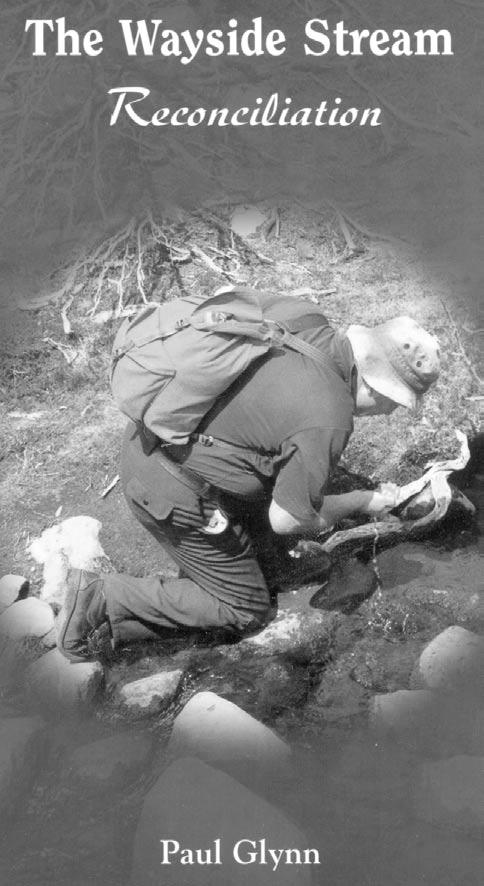
R E A D I N G
T
The spring-summer (Northern Hemisphere) issue of THE CHESTERTON REVIEW is on its way to Australasian subscribers after a very lengthy wait but its contents will help to make up for the delay. It is the largest double issue ever, running to 300 pages in the usual format.
is currently happening at their instigation. There is, I think, a much more balanced and realistic appraisal of Pope John Paul 11 contained in an article by Eamon Duffy in the "The Tablet" of October 18, 2003. P e t e r B e e s o n
A word of thanks
A word of thanks to Father Elias Mary of the Franciscans of the Immaculate who is leaving after three wonderful years of preaching the Gospel of Jesus Christ. He has helped my family and me and numerous others on our journey of faith by his imitation of Christ. May Our Lady always protect and guide him. A l e x S p a d a c c i n i
It is dedicated to Ireland Then and Now; in G K C’s time as shown by a fine selection of items from his pen and now in a series of no less than ten essays from contemporary writers well known in that capacity to regular readers of The Review. The usual letters and News and Comments sections contain a great deal of interesting material and the Book Reviews, although at first glance they appear in some instances to be somewhat delayed (some 1998 books are included), are worthy of a closer look as they often show a new perspective. Most of these will now be available in Australasia. Included is a review of a reprint (with new introduction) from Christopher Dawson, named all those years ago by T.S. Elliot ‘as one of the greatest and most influential thinkers in England.’
Coverage is given to the obsequies for Cardinal Carter held in Toronto together with an excellent picture of the sanctuary during the Mass. New subscribers to The Review are always welcome. Enquiries should be sent to Mr H.J. Hayes, ‘Long Swamp, Osborne’s Flat, RMB 3115, YACKANDANDAH VIC 3749, who is the Australasian representative for The International Chesterton Institute, Seton Hall University, New Jersey USA, publishers of The Review.
The Review continues to be published three times annually, including the double issue.
The Record 14 30 october 2003
h e C h e s t e r t o n R e v i e w
T h e A u s t r a l i a n C a t h o l i c H i s t o r i c a l S o c i e t y J o u r n a l
Fr Eris O’Brien
dnuorA
eh lbat e LETTERS TO THE EDITOR MORELETTERS
Around t he tabl e
t
Edwards 9388 6773all hours.
LIC.PLUMBER
HUMBLE MESSENGER
RELIGIOUS CATHOLIC SHOP 16/80 Barrack Street, PERTH (inside Bon Marche Arcade).New phone number:9225 7199.
RELIGIOUS PRODUCTS
Bibles, Books, CD’s, Cards, gifts, Statues, Baptism & Communion Apparel, Albs, Vestments and much more.
RICH HARVEST,39 Hulme Court,Myaree,9329 9889 after 10.30am.
SECURITY
DO YOU NEED MORE: Phone & TV aerial sockets, secuity alarms installed or relocated.Get a registered cabler (T08629), police licenced.Daniel:0417 977 779 or 93433278
THANK YOU
ALL areas.Mike Murphy 0416 226 434.
J.M.J.St Peregrine, St Anne, St Mary McKillop, St Anthony, St Terese.Cancer cured.H.J.D.
VISITING SYDNEY
Why not stay at
STORMANSTON HOUSE
27 McLaren Street,North Sydney Restful & secure accommodation operated by the Sisters of Mercy, North Sydney.
• Situated in the heart of North Sydney and short distance to the city
• Rooms available with ensuite facility
• Continental breakfast, tea/coffee making facilities & television
• Separate lounge/dining room, kitchen & laundry
• Private off-street parking
Contact:Phone:(02) 9957 5040 or email:nsmercy@ozemail.com.au
official diary
OCTOBER
31Confirmation,
9
Confirmation,
Procession
Confirmation,
-
Sunday November 2
DIVINE MERCY
An afternoon with Jesus and Mary at St Mary’s Cathedral at 1.30pm. Holy Rosary and Reconciliation. Sermon: Holy Souls in Pergatory with Fr Richard Tomeltyfollowed by Divine Mercy prayers and Benediction. Enquiries: John 9457 7771 or Linda 9275 6608
Sunday November 2
ETERNAL WORD TELEVISION
NETWORK. 1 - 2 pm on Access 31. A tribute to our Holy Father in recognition of his Silver Jubilee Pope John Paul II : Conscience of the World [EWTN Global Showcase]. The following Sunday’sprogram willfocus on Blessed Mother Teresa of Calcutta. A huge range of these inspiring programs is available in free video lending libraries, and also direct free-to-air via satellite dish 24 hours a day. For information contact The Rosary Christian Tutorial Association. Please make sure the weekly broadcast on Access 31, will continue, by sending a cheque or money order made payable to the RCTA, PO Box 1270, Booragoon 6954. Phone enquiries: 9330-1170 for information about tapes, or about direct debit in support of EWTN broadcasts.
Monday November 3
LATIN MASSES
All Souls Day – 10am Low Mass for deceased Legionaries of Mary at St Francis Xavier Church, Windsor St, East Perth. 1.10pm Low Mass and 6.30pm Sung Mass at St John’s Pro-Cathedral, Victoria Ave, Perth, with exposition in between praying for Holy Souls in Purgatory. Sung Absolution prayers for the Holy Souls after 6.30pm Mass. Plenary Indulgence, under usual conditions, to those who visit a church and recite a Pater and Credo. All Welcome, enquiries Fr Michael Rowe 9444 9604.
Tuesday November 4
Parenting: Enriching Family
Presenter: Ean James (Clinical Psychologist). $5 (donation unwaged). Multi-purpose Room John XXIII College (follow signs) 7.30-9.30pm. Details: Murray 93830444.
Tuesday November 4
NOVENA DEVOTION
In honour of The Infant Jesus of Prague. Every Tuesday at 11am and 1pm at St Mary’s Cathedral. Please join us in prayer for our Holy Father, priests and religious, holy vocations, the sick, the deceased and all your special intentions
Wednesday November 5
NOVENA DEVOTION
In honour of St Joseph, every Wednesday at 1pm at St Mary’s Cathedral. Please join us in prayer for our Holy Father, priests and religious, holy vocations, the sick, the deceased and all your special intentions.
Wednesday November 5
ST DOM’S DEVOTIONS TO ST JOSEPH
Devotions to St Joseph held every Wednesday at 8.40am at St Dominic’s parish in Innaloo. Enquiries, contact Paul on 9445 7262 or Sandra 9244 3425.
Wednesday November 5
CATHOLIC SOCIAL JUSTICE WORKSHOPS
The Catholic Social Justice Council present a series of four workshops where participants are invited to reflect on Australian Stories containing issues which relate to the Social Justice Sunday
Statement (A Generous Heart in the Love of Christ: Challenging Racism in Australia Today); and the background leading up to each story. Followed by a n examination ofwhat the Scriptures tell us about the issue; then a search for practical ways to demonstrate our Christian values in our parish communities. 7pm; Wednesday November5, 12 and19 at St Andrew’s Parish, Clarkson. Prerequisite: Participants should acquaint themselves fully with the Social Justice Sunday Statement 2003.
Thursday November 6 ST PADRE PIO PRAYER GROUP Meets every 2nd Thursday of the month, 7.30 to 8.30pm at St Bernadette’s Church, 51 Jugan St, Glendalough. Includes Exposition of the Blessed Sacrament and Benediction. All welcome.
Thursday November 6
ESTATE PLANNING SEMINAR
ARAFMI Mental Health Carers and Friends Association. The Niche at Sir Charles Gairdener Hospital, 9.30am –3.30pm. (no charge, donations accepted). Estate planning issues for people who are concerned about the future for their mentally ill family member or friend when they are deceased. Further information please contact ARAFMI Perth 9228 0577 or Midland 9250 7611. Lunch and refreshments provided.
Friday November 7
ALLIANCE AND TRIUMPH OF THE TWO HEARTS
All night vigil of reparation to the Hearts of Jesus and Mary at St Bernadette’s Church, Jugan St, Glendalough. Commencing at 9pm with HolyMass. Concluding with Parish Mass at 7.30am followed by Benediction. Light refreshments available during the night. Enquiries 9342 5845.
Friday November 7
PRO-LIFE PROCESSION MIDLAND
The First Friday Mass, Procession and Rosary Vigil will commence at 9.30am at St Brigid’s, Midland. The Franciscan Friars of the Immaculate will lead us. All are invited to witness for the sanctity of life and pray for the conversion of hearts. Enquiries: Helen 9402 0349.
Friday-Saturday November 7-8
REIGN OF THE TWO HEARTS
All night Vigil and Eucharistic Adoration. All Saints Chapel, Allendale Square. Devotions to the Sacred Heart of Jesus and the Immaculate Heart of Mary inclusive commencing at 9pm with Holy Mass, Rosaries, Hymns and Prayers. Concluding with Holy Mass at 7am. Enquiries 9444 1940 or 9385 8563. Please come and join us in prayer. Tea, coffee and sandwiches available during the night.
Saturday November 8
HOLY HOUR
Friends of Our Lady Queen of Peace, Achill Island are invited to St Bernadette’s, Glendalough to pray for a House of Prayer in WA. In accordance with Our Lady’s request to Christina Gallagher for Houses of Prayer throughout the World. Enq. Cathy 9444 1940 or Maree 9244 8891.
Saturday November 8
LEGION OF MARY ANNUAL MASS
In honour of the life of Founder Frank Duff at St Mary’s Cathedral. Rosary and Legion prayers at 1.30pm, Mass at 2pm.
Archbishop Barry Hickey will say the Mass with Spiritual Directors of The Legion. All welcome.
Sunday November 9
BULLSBROOK PILGRIM MASS FOR THE SICK
The Sacrament of the sick will be administered for spiritual and physical healing during Holy Mass celebrated at 2.30pm at the Shrine of Virgin of the Revelation, Chittering Rd, Bullsbrook. Exposition, Rosary and Benediction precede Mass at 2pm. Reconciliation is from 1.30pm. All welcome. Pilgrimage Mass celebrated at the Shrine 2.30pm every Sunday. Enquiries Tel. SACRI Assoc. 9447 3292.
November 14,15 & 16
HOLY SPIRIT OF FREEDOM COMMUNITY – WEEKEND RETREAT
The Holy Spirit of Freedom Community is holding an open retreat at Karriholm –God’s Sanctuary in Pemberton. The weekend commences at 7.30pm on Friday night and concludes on Sunday afternoon. For further enquiries call Orial Khalife at Karriholm on 9776 1734 or Marcelle Batticci on 9776 1542.
Monday-Wednesday November 17-19
PROGRAM FOR THE VISIT OF Rev Fr Donal McIlraith, the priest responsible for the MMP in Oceania, : 17th Day of Reflection at St Patrick’s Church, York. Commencing at 10am, concluding with Holy Mass at 2pm. 18th Day of Reflection at St Paul’s Church, Swanbourne,10.30am Cenacle, Holy Mass, talks. Concludes at 2pm. 19th Day of Reflection at St Bernadette’s Church, Glendalough, 10.30am Cenacle, Holy Mass, talks. Concludes at 2pm. 7.30pm Cenacle/Holy Mass.BYO shared plate for lunch each day.
Thursday November 20
MOTHERS PRAYER MASS
Our Lady Queen of Apostles Church, 57 Tudor Ave South, Riverton. For all Mothersand Grandmothers coming together to pray for their children. Fathers, Grandfathers welcome. For information regarding the Mass contact Veronica Peake on 9447 0671.
Sunday November 23
ST CATHERINE’S CHURCH GINGIN
Christ The King - Divine Mercy Pilgrimage. Program: 11.30am - 12.30pm Holy Hour. 12.30pm - 1.30pm BYO Lunch. 1.30pm Eucharistic Procession through the streets. 2.50pm Divine Mercy Chaplet & Three o’clock prayers 3pm Holy Mass, Rosary & Benediction. 4.15pm Consecration/Veneration - Relic of Saint Faustina. 4.30pm Afternoon Tea provided. Coaches depart: Mercedes College Car Park 9.30am. To book please phone Francis Williams 9459-3873 or Mob 0404 893 877. Transport cost $14.00 per person (Return). For more details phone Fr Paul 9571-1839, John 9457-7771 or Sheila 9575-4023.
CROSS ROADS COMMUNITY
Healing Masses:1st Monday 7pm, Church of East Fremantle, 2nd Monday 10am St Jerome’s Munster & 3rd Monday 7pm St Dominic’s Innaloo. Term 4 runs to December 19 for:Family & Friends Support Groups of Substance AbusersWednesdays 7-9pm, Substance Abusers Support Groups Tuesdays 5.30 –7.30pm& Friday’s 2–3.30 & All Day Group for Substance AbusersFridays 10.30-3.30pm, Spirituality: Tuesday’s 79pm & Healing Mass:Friday’s 12noon.
The Record 30 october 2003 15 eye Catcher CLASSIFIEDS Classified ads: $3 per line (plus GST) 24-hour Hotline: 9227 7778 Deadline: 5pm Monday
NedlandsMgr Peter McCrann
Meeting of Wheatbelt ParishesBishop Sproxton
Meeting of WACRI and WA BishopsArchbishop Hickey, Bishop Sproxton Clergy Mass and Dinner celebrating Feast of St Charles BorromeoArchbishop Hickey, Bishop Sproxton 4 Meeting of WA Province of BishopsArchbishop Hickey, Bishop Sproxton 6Visit Confirmation Candidates at St Helena's, Ellenbrook
Evening with Vocations EnquirersArchbishop Hickey
Legion of Mary Mass to commemorate life of Frank Duff, St Mary's CathedralArchbishop Hickey Blessing of garden, Canning Vale Parish - Archbishop Hickey
NOVEMBER 2
3
7
8
Confirmation, EllenbrookArchbishop Hickey
Mercy CollegeMgr Tim Corcoran
for Feast of St Rocco, Leederville - Archbishop Hickey
12
11 &
Morley
Fr Brian O'Loughlin VG
CEO Team - Archbishop Hickey panorama a roundup of events in the archdiocese
13Visit
FURNITURE REMOVAL
/gas fitter, Contact John on 9457 7771, Mobile 0412 185 209. BUILDING TRADES
PAINTING Pty Ltd for all your residential, commercial painting requirements.Phone Tom Perrott 9444 1200. BRICK re-pointing.Phone Nigel 9242 2952 ELECTRICIAN, Power/light points from $50 each. Rewiring our speciality. 0418 941 286, 9279 5008. PICASSO Painting.Top service.Phone 9345 0557, fax 9345 0505. ACCOUNTANT
RETURNS, mobile tax return preparation service.For all your tax and accounting needs - business and personal.Contact John
PERROTT
TAX
“Ryan doesn't think he's special at all. He says that not everyone is called to drill wells, but everyone is called to make some difference in the world around, by helping a sibling, for instance, in his homework”
Ryan Hreljac’s Well Foundation
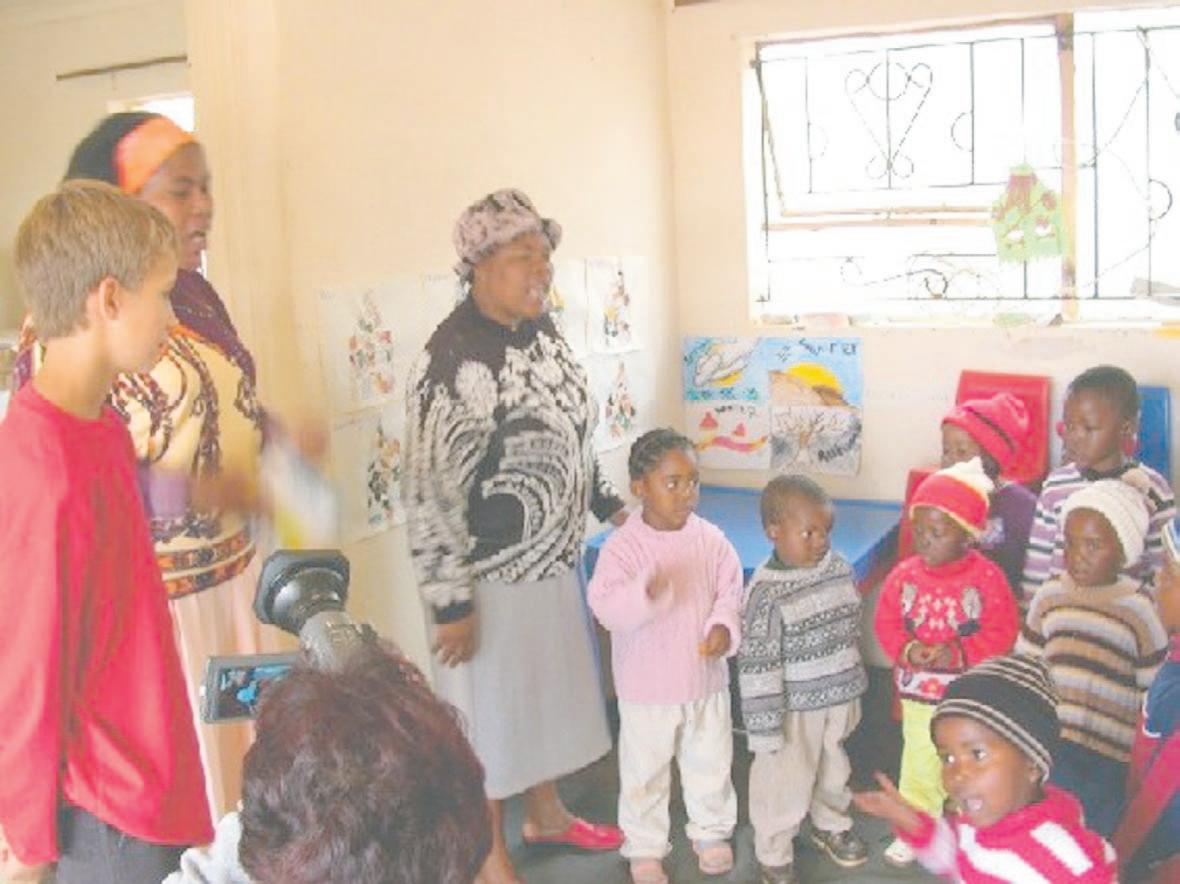
ACanadian 12-year-old
w as one of those who r eceived Communion from the hands of John Paul II himself, at the 25th anniversary Mass of the Pope's pontificate.
Ryan's story began in 1997. One day the 6-year-old from Kemptville, Ontario, asked his parents, Mark and Susan, to give him $70 for poor people in Africa.
"They don't have clean water to drink," the little boy explained. "They drink bad water from swamps and streams and get sick and die. We heard about them in school today. My teacher said it would cost $70 to dig them a well.
So can I have it?"
Ryan's parents were proud of their son's generosity, but they could not picture people digging wells in Africa for a Canadian first-grader.
As usual, Ryan kneeled at his bed that night and prayed: "Please, God, bless Mum and Dad and my two brothers. And let there be clean water for everybody in Africa."
Mark and Susan encouraged Ryan to earn the money by doing extra chores, in addition to setting the table, feeding the dog and making his own bed.
For many weeks the boy washed the windows, swept the garage, helped the neighbours with their yard work, picked up branches after ice storms, collected pine cones for his grandmother to use in her craft projects.
Each night his prayers ended with the then familiar "And please help me get clean water for the poor people in Africa."
Four months later, Susan and Ryan went to WaterCan's office, an Ottawa-based organisation

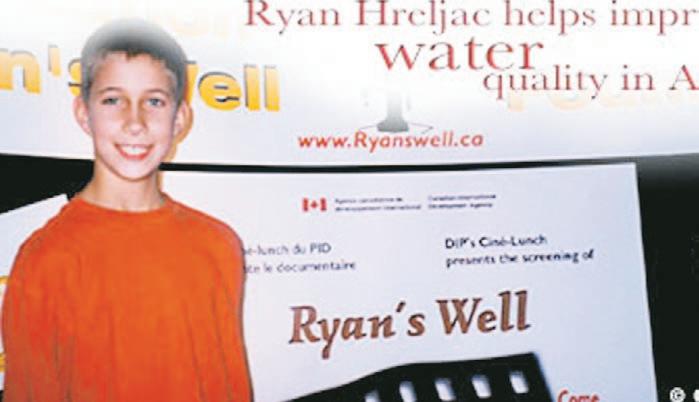
How one little boy has made a big difference to thousands who need clean water.
that digs wells in Africa. Ryan presented his savings to the organisation's director, Nicole Bosley, who thanked him and told him that $70 only buys a hand pump. To drill a well actually cost $2,000.
Ryan was not fazed by this news. "That's OK," he said. "I'll just do more chores."
Ryan did more chores throughout the spring, the summer and the fall, earning only a few dollars a week.
A friend of Susan, Brenda, published a story about Ryan's project in the local paper, the Kemptville Advance.
Some funds trickled in from sympathetic readers. Later, the Ottawa Citizen ran a story about "Ryan's Well."
Then a TV station did a feature on the now 7-year-old boy. Cheques flooded in until Ryan approached the $1,000 mark. Then the Canadian International Development Agency, which works with WaterCan, matched Ryan's funds two to one.
Ryan and his mother were invited to a special WaterCan meeting, where Ryan and Gizaw Shibru, the Canadian Physicians for Aid and Relief (CPAR) director for Uganda, picked the location for the well, Angolo Primary School.
Shibru explained the well would be dug by hand, because even a small drill costs $25,000.
"Maybe I can start raising money for a drill so you can build more wells," the little boy said.
Ryan immediately got back to fund raising. His younger brother Keegan helped out by licking and sealing envelopes while Jordan, his older brother, prepared the
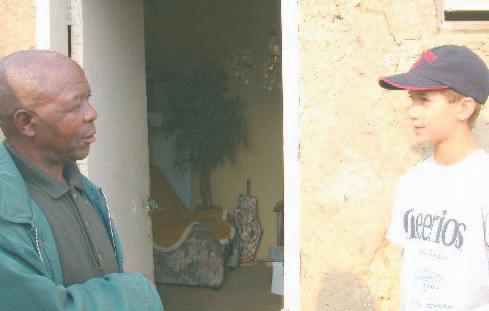
audiovisual equipment for Ryan's presentations.
After his homework, Ryan went out to speak at various service clubs.
The more he spoke, the more donations came in. Ryan's second-grade class put a donation can in their room and started a pen-pal campaign with the Angolo Primary students. Ryan's pen pal was Jimmy Akana, an 8year-old orphan.
In January 1999, the Hreljacs received word that Ryan's well was helping a great many thirsty villagers. Ryan prayed that night for something more: "God, please look after my friends Jimmy and Gizaw, and let me see my well some day." Ryan's parents explained to their son that they could start saving for a trip to Uganda but he might be 12 years old before they had saved enough.
On New Year's Day 2000, Beverly and Bruce Paynter, the Hreljacs' next-door neighbours, gave the Hreljacs all their fre-
quent-flier miles, more than enough for three people to fly as far as London, England. With those miles and some generous support from others, Mark, Susan and Ryan flew to Africa in July. With Gizaw Shibru they arrived at Angolo in a pickup truck, where hundreds of people along the road chanted, "Rayan! Rayan! Rayan!"
Scores of children in blue and white uniforms lined the road and clapped in unison as Ryan walked the last yards toward the well, which was adorned with flowers, and had this inscription at its base: Ryan's Well, Funded by Ryan H.
At that moment, Ryan and Jimmy met for the first time. They grasped the well handle and pumped forth a cool stream. They cupped their hands to catch the water and drank the water both boys dreamt about for a long time.
After the trip, Canadian Olympic gold-medalist wrestler Daniel Igali wrote Ryan asking
him to help build wells in Nigeria, Daniel's birthplace, where he was building a school. Ryan and Igali spoke together in schools and appeared on the popular morning TV show "Canada AM." Later, they went to Nigeria to see the fruits of their labor.
Ryan has participated in many Canadian and international conferences, such as the World Summit on Sustainable Development -- the Johannesburg Summit that took place in August-September 2002, and the World Water Forum and the Children's World Water Forum held in Japan in 2003, where, at the request of UNICEF, Ryan delivered presentations and sat on several panels, including the Asian Development Bank's Water and Poverty Closing Plenary Session.
He has appeared twice on the "Oprah Winfrey Show" and a number of TV shows. His successful Ryan's Well documentary has been featured at the Wine Valley Film Festival-Movies in California and at the first Boston International Film Festival.
In April 2001, the little boy founded the Ryan's Well Foundation and to date, thanks to matching funds from groups like CPAR, Ryan's been responsible for raising almost $1 million and building over 70 wells in Africa.
Yet, as his mother says, "Ryan doesn't think he's special at all. He says that not everyone is called to drill wells, but everyone is called to make some difference in the world around, by helping a sibling, for instance, in his homework." - Zenit
The Record 16 30 october 2003
(Left to Right) Ryan visits an African kindergarten that benefits from use of a new well, a small child pours water from one of the wells built using the funds raised by Ryan, Ryan Hreljac at the screening of Ryan's Well, a documentary produced by CIDA's Development Information Program.
Ryan meets some of the people his work is helping.









 Terry Loughnan
Terry Loughnan

















 By Patricia Zapor
Photos: CNS
By Patricia Zapor
Photos: CNS



 Photos:CNS/Reuters
Photos:CNS/Reuters
 By Cindy Wooden
By Cindy Wooden













